
-
Kiarostami & Deleuze: The Path, a Metaphor of a Philosophical Journey
 Abbas Kiarostami's modern films feature a movement-image of the path as a narrative and stylistic motif. This article is concerned with a philosophical aspect of Kiarostami's modern cinema by examining what the movement-image of the path is in accordance with Gilles Deleuze's cinematic-philosophical theory. This includes a new interpretation of concepts such as movement, time, and space. Abbas Kiarostami's modern films feature a movement-image of the path as a narrative and stylistic motif. This article is concerned with a philosophical aspect of Kiarostami's modern cinema by examining what the movement-image of the path is in accordance with Gilles Deleuze's cinematic-philosophical theory. This includes a new interpretation of concepts such as movement, time, and space.
-
Hamed Soleimanzadeh, Jury Member of the 39th Warsaw International Film Festival
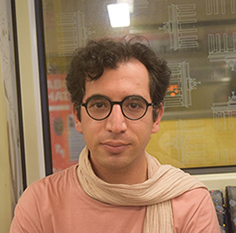 Soleimanzadeh's colleagues on the FIPRESCI jury include MIKE NAAFS (a Dutch critic) and DINU-IOAN NICULA (a Romanian critic). It is worth noting that Hamed Soleimanzadeh is the sole Iranian filmcritic on the international stage who has served as a jury member in more than twenty renowned global film festivals, including Cannes, Berlinale, Karlovy Vary, and the Golden Globe Awards, among others, making him a record holder in this regard.
Soleimanzadeh's colleagues on the FIPRESCI jury include MIKE NAAFS (a Dutch critic) and DINU-IOAN NICULA (a Romanian critic). It is worth noting that Hamed Soleimanzadeh is the sole Iranian filmcritic on the international stage who has served as a jury member in more than twenty renowned global film festivals, including Cannes, Berlinale, Karlovy Vary, and the Golden Globe Awards, among others, making him a record holder in this regard.
-
FIPRESCI Critsics' Perspective on Iranian Independent Cinema (Part- Twelve)
_102.jpg) Valerie Ganne
Journalist and Film Critic/France
How did you become acquainted with Iranian Cinema? And when was the first time you watched an Iranian film?
I discovered Iranian cinema when I was 25 and with Abbas Kiarostami’s films. He paved the path for the other Iranian directors. Iranian cinema has become an important one for me for almost 30 years, and I’ve been following it for years.
Valerie Ganne
Journalist and Film Critic/France
How did you become acquainted with Iranian Cinema? And when was the first time you watched an Iranian film?
I discovered Iranian cinema when I was 25 and with Abbas Kiarostami’s films. He paved the path for the other Iranian directors. Iranian cinema has become an important one for me for almost 30 years, and I’ve been following it for years.
-
FIPRESCI Critsics' Perspective on Iranian Independent Cinema (Part- Eleven)
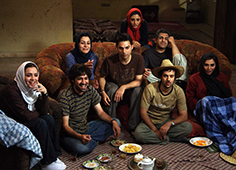 Kostas G. Karderinis
Film Critic/Greece
Which of the Iranian filmmakers do you like the most?
Without any order: Dariush Mehrjui, Mohsen Makhmalbaf and his entire family, Abbas Kiarostami, Bahman GHobadi, Asghar Farhadi, Manijeh Hekmat, Rakhshan Banietemad, Shirin Neshat, Shoja Azari, Marjan Satrapi, Jafar Panahi, Babak Payami, Majid Majidi, Kianoush Ayari, Mohammad Rasoulof, Amir Naderi, Ramin Bahrani, Abolfazal Jalili, Ebrahim Forouzesh, Parviz Shahbazi, Mohsen Amiryoussefi, Hossein Shahbi, Vahid Jalilvand, Ali Asgari, Sadaf Foroughi, Reza Mirkarimi, and Ali Souzandeh.
Some directors are out of the country and can make films with no limitations. Some others work in silence
Kostas G. Karderinis
Film Critic/Greece
Which of the Iranian filmmakers do you like the most?
Without any order: Dariush Mehrjui, Mohsen Makhmalbaf and his entire family, Abbas Kiarostami, Bahman GHobadi, Asghar Farhadi, Manijeh Hekmat, Rakhshan Banietemad, Shirin Neshat, Shoja Azari, Marjan Satrapi, Jafar Panahi, Babak Payami, Majid Majidi, Kianoush Ayari, Mohammad Rasoulof, Amir Naderi, Ramin Bahrani, Abolfazal Jalili, Ebrahim Forouzesh, Parviz Shahbazi, Mohsen Amiryoussefi, Hossein Shahbi, Vahid Jalilvand, Ali Asgari, Sadaf Foroughi, Reza Mirkarimi, and Ali Souzandeh.
Some directors are out of the country and can make films with no limitations. Some others work in silence
-
FIPRESCI Critsics' Perspective on Iranian Independent Cinema (Part- Ten)
_100.jpg) Stephen Aspeling
Film Critic/South Africa
How much do you know about Iranian culture? Do you know any Iranian artists out of the field of cinema?
I am from South Africa, that is, the country where television started operating in 1976 with extensive censorship and a history of national and international discrimination. Due to this reason and some other obstacles, my access to Iranian history, culture, and art was extremely limited. I literally know Iran via its films.
Stephen Aspeling
Film Critic/South Africa
How much do you know about Iranian culture? Do you know any Iranian artists out of the field of cinema?
I am from South Africa, that is, the country where television started operating in 1976 with extensive censorship and a history of national and international discrimination. Due to this reason and some other obstacles, my access to Iranian history, culture, and art was extremely limited. I literally know Iran via its films.
-
FIPRESCI Critsics' Perspective on Iranian Independent Cinema (Part- Nine)
 Ron Fogel
University Lecturer and Film Critic
What are the main factors for the success of Iranian cinema at variety of film festivals in the world?
First, I must name the high quality of the films. Also, I think all cinema lovers around the world would like to know the process of filmmaking in Iran, despite censorship and restrictions. Screening Iranian films at festivals is a reminder of freedom of speech and art. I also think that foreign audiences can easily connect with Iranian films since they can see how an ordinary person (not wealthy or powerful) leaves his ordinary life behind in search of a new adventure.
Ron Fogel
University Lecturer and Film Critic
What are the main factors for the success of Iranian cinema at variety of film festivals in the world?
First, I must name the high quality of the films. Also, I think all cinema lovers around the world would like to know the process of filmmaking in Iran, despite censorship and restrictions. Screening Iranian films at festivals is a reminder of freedom of speech and art. I also think that foreign audiences can easily connect with Iranian films since they can see how an ordinary person (not wealthy or powerful) leaves his ordinary life behind in search of a new adventure.
-
FIPRESCI Critsics' Perspective on Iranian Independent Cinema (Part- Eight)
_98.jpg) Pelagie Ngonana
Journalist and Film Critic/Cameroon
What are the main factors for the success of Iranian cinema at a variety of film festivals in the world?
In my opinion, Iranian cinema has an amazing artistic and technical quality. It’s concerned with the details. In addition, it goes beyond the author's cinema and the genre rules of cinema, which is why it has attracted the attention of international festivals. Despite censorship and some restrictions, Iranian filmmakers have successfully and bravely won great titles.
Pelagie Ngonana
Journalist and Film Critic/Cameroon
What are the main factors for the success of Iranian cinema at a variety of film festivals in the world?
In my opinion, Iranian cinema has an amazing artistic and technical quality. It’s concerned with the details. In addition, it goes beyond the author's cinema and the genre rules of cinema, which is why it has attracted the attention of international festivals. Despite censorship and some restrictions, Iranian filmmakers have successfully and bravely won great titles.
-
FIPRESCI Critsics' Perspective on Iranian Independent Cinema (Part- Seven)
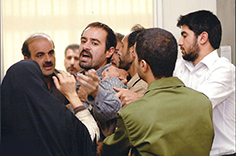 Erdogan Mitrani
Film critic and Architect/Turkey
How did you become acquainted with Iranian Cinema? And when was the first time you watched an Iranian film?
I heard about the emersion new wave of Iranian cinema, and I watched two Iranian films about 30 years ago at the Istanbul Film Festival. The first one was Mohsen Makhmalbaf’s The Cyclist. The thing that impressed me deeply in that film was the movement from a personal, surreal, and tragic story to making caustic political criticisms. The second one, which I can say was like a great discovery for me, was Bahram Beyzaei’s Bashu, the Little Stranger. I fell in love with Beyzaei’s extremely poetic and cinematic language. Also, I understood that Iran is not only a very large country with the historical background of an ancient empire, but also a continent with a variety of languages, races, and cultures coexisting together. After that experience, I have watched almost all of Beyzaei’s works, and he is my number one director among the old generation of Iranian filmmakers.
I’ve become acquainted with the new generation of Iranian filmmakers through the works of Mohsen Makhmalbaf, his wife and daughters, Abbas Kiarostami, Jafar Panahi, Mohammad Rasoolof, Majid Majidi, Asghar Farhadi and a few others. Their creativity, simplicity, and honesty have impressed me to my heart. I’m sorry to say this but creativity mostly thrives in constraint.
Erdogan Mitrani
Film critic and Architect/Turkey
How did you become acquainted with Iranian Cinema? And when was the first time you watched an Iranian film?
I heard about the emersion new wave of Iranian cinema, and I watched two Iranian films about 30 years ago at the Istanbul Film Festival. The first one was Mohsen Makhmalbaf’s The Cyclist. The thing that impressed me deeply in that film was the movement from a personal, surreal, and tragic story to making caustic political criticisms. The second one, which I can say was like a great discovery for me, was Bahram Beyzaei’s Bashu, the Little Stranger. I fell in love with Beyzaei’s extremely poetic and cinematic language. Also, I understood that Iran is not only a very large country with the historical background of an ancient empire, but also a continent with a variety of languages, races, and cultures coexisting together. After that experience, I have watched almost all of Beyzaei’s works, and he is my number one director among the old generation of Iranian filmmakers.
I’ve become acquainted with the new generation of Iranian filmmakers through the works of Mohsen Makhmalbaf, his wife and daughters, Abbas Kiarostami, Jafar Panahi, Mohammad Rasoolof, Majid Majidi, Asghar Farhadi and a few others. Their creativity, simplicity, and honesty have impressed me to my heart. I’m sorry to say this but creativity mostly thrives in constraint.
-
FIPRESCI Critsics' Perspective on Iranian Independent Cinema (Part- Six)
_96.jpg) Hsin Wang
Writer and Film Critic/Taiwan
What are the main factors for the success of Iranian cinema at a variety of film festivals in the world?
What are the main factors for the success of Iranian cinema at a variety of film festivals in the world?
In my opinion, Iranian cinema has an amazing artistic and technical quality. It’s concerned with the details. In addition, it goes beyond the author's cinema and the genre rules of cinema, which is why it has attracted the attention of international festivals. Despite censorship and some restrictions, Iranian filmmakers have successfully and bravely won great titles.
Hsin Wang
Writer and Film Critic/Taiwan
What are the main factors for the success of Iranian cinema at a variety of film festivals in the world?
What are the main factors for the success of Iranian cinema at a variety of film festivals in the world?
In my opinion, Iranian cinema has an amazing artistic and technical quality. It’s concerned with the details. In addition, it goes beyond the author's cinema and the genre rules of cinema, which is why it has attracted the attention of international festivals. Despite censorship and some restrictions, Iranian filmmakers have successfully and bravely won great titles.
-
FIPRESCI Critsics' Perspective on Iranian Independent Cinema (Part- Five)
_95.jpg) Jean-Max Mejean
Writer and Film Critic/France
How much do you know about Iranian culture? Do you know any Iranian artists out of the field of cinema?
I know that Iran has a much enriched cultural background. I studied about Iran and its monarchy during my school days. Iran is a Middle Eastern country that has always amazed the Western world with its wealth and art. In the 80s, and during the Revolution, we got more familiar with Iran because Ayatollah Khomeini was staying in Paris at that time, and he lived in Neauphle-le-Château, near Marguerite Duras’s house. Those days, we mostly knew the writers who had fled from the country and had taken refuge in France; writers such as Serge Rezvani. Through animated films, such as Marjane Satrapi's Persepolis, I learned more about Iran's situation after the Islamic Revolution. Among other Iranian well-known artists, I can name Pouya Ali Nia (Musician), Paria Vatankhah (visual artist), Golshifteh Farahani (actress), and Nahal Tajadod (writer) who was Jean-Claude Carrière’s wife. I know these people because some of these Iranian artists live in France. Unfortunately, I don’t know much about Iranian contemporary art, except for the cinema field.
Jean-Max Mejean
Writer and Film Critic/France
How much do you know about Iranian culture? Do you know any Iranian artists out of the field of cinema?
I know that Iran has a much enriched cultural background. I studied about Iran and its monarchy during my school days. Iran is a Middle Eastern country that has always amazed the Western world with its wealth and art. In the 80s, and during the Revolution, we got more familiar with Iran because Ayatollah Khomeini was staying in Paris at that time, and he lived in Neauphle-le-Château, near Marguerite Duras’s house. Those days, we mostly knew the writers who had fled from the country and had taken refuge in France; writers such as Serge Rezvani. Through animated films, such as Marjane Satrapi's Persepolis, I learned more about Iran's situation after the Islamic Revolution. Among other Iranian well-known artists, I can name Pouya Ali Nia (Musician), Paria Vatankhah (visual artist), Golshifteh Farahani (actress), and Nahal Tajadod (writer) who was Jean-Claude Carrière’s wife. I know these people because some of these Iranian artists live in France. Unfortunately, I don’t know much about Iranian contemporary art, except for the cinema field.
-
FIPRESCI Critsics' Perspective on Iranian Independent Cinema (Part- Four)
_94.jpg) Usman Ghafoor
Film Critic/Pakistan
How did you become acquainted with Iranian Cinema? And when was the first time you watched an Iranian film?
My first encounter with Iranian cinema goes back to the mid-2000s and Majid Majidi’s Children of Heaven. I was moved by the film's simplicity and its lack of any dramatic frills or embellishments in portraying life in a city in Iran, and particularly its child heroes. After watching Majid Majidi’s The Color of Paradise and Baran, Abbas Kiarostami’s The Wind Will Carry Us and Taste of Cherry, and Asghar Farhadi’s A Separation and The Salesman, I became a huge fan of Iranian cinema. I didn’t even care if the DVDs had English subtitles or not because it is impossible not to be influenced by the visual language of the films.
Usman Ghafoor
Film Critic/Pakistan
How did you become acquainted with Iranian Cinema? And when was the first time you watched an Iranian film?
My first encounter with Iranian cinema goes back to the mid-2000s and Majid Majidi’s Children of Heaven. I was moved by the film's simplicity and its lack of any dramatic frills or embellishments in portraying life in a city in Iran, and particularly its child heroes. After watching Majid Majidi’s The Color of Paradise and Baran, Abbas Kiarostami’s The Wind Will Carry Us and Taste of Cherry, and Asghar Farhadi’s A Separation and The Salesman, I became a huge fan of Iranian cinema. I didn’t even care if the DVDs had English subtitles or not because it is impossible not to be influenced by the visual language of the films.
-
FIPRESCI Critsics' Perspective on Iranian Independent Cinema (Part- Three)
_93.jpg) Holger Twele
Film Critic/Germany
How did you become acquainted with Iranian Cinema? And when was the first time you watched an Iranian film?
I can’t say for sure whether I was familiar with Iranian cinema before 1989, but I am completely positive that I watched Abbas Kiarostami’s Where is the Friend’s House? at the Locarno Film Festival that year. I was deeply impressed by its simple story and visual language. It was later screened at cinemas in Germany, but it was inaccessible for a few years. The Federal Agency for Civic Education put this film in its top 30 titles, suggesting that every child in the country should watch this film during their education. In the following years, I watched many Iranian films from different directors such as Samira, Hana and Mohsen Makhmalbaf, Marziyeh Meshkini, Majid Majidi, Jafar Panahi, Mohammad Rasoulof and Mostafa Al Ahmad.
Holger Twele
Film Critic/Germany
How did you become acquainted with Iranian Cinema? And when was the first time you watched an Iranian film?
I can’t say for sure whether I was familiar with Iranian cinema before 1989, but I am completely positive that I watched Abbas Kiarostami’s Where is the Friend’s House? at the Locarno Film Festival that year. I was deeply impressed by its simple story and visual language. It was later screened at cinemas in Germany, but it was inaccessible for a few years. The Federal Agency for Civic Education put this film in its top 30 titles, suggesting that every child in the country should watch this film during their education. In the following years, I watched many Iranian films from different directors such as Samira, Hana and Mohsen Makhmalbaf, Marziyeh Meshkini, Majid Majidi, Jafar Panahi, Mohammad Rasoulof and Mostafa Al Ahmad.
-
FIPRESCI Critsics' Perspective on Iranian Independent Cinema (Part- Two)
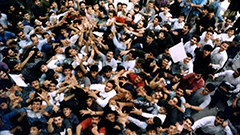 Aina Randrianatoandro
Film critic, Programmer for cultural and film festivals, Animator/Madagascar
How much do you know about Iranian culture? Do you know any Iranian artists out of the field of cinema?
Iran has a rich and ancient history of art, music, philosophy, tradition, and ideology. Having this profound and historical culture has secured Iranian civilization from the chaos of its surrounding world. Searching for justice and equality is one of the most important aspects of Iranian culture, along with some other attributes such as respecting the parents and showing kindness and love toward any foreign guests.
I know a lot of Iranian Artists apart from the field of cinema, especially some of the most well-known contemporary writers and poets such as Sadegh Hedayat, Ahmad Shamloo, Ali Shariati, Fereydoon Moshiri, Foroogh Farokhzad, etc.
Since I read a lot, I know about Iran and Iranian culture through the many books I’ve read...
Aina Randrianatoandro
Film critic, Programmer for cultural and film festivals, Animator/Madagascar
How much do you know about Iranian culture? Do you know any Iranian artists out of the field of cinema?
Iran has a rich and ancient history of art, music, philosophy, tradition, and ideology. Having this profound and historical culture has secured Iranian civilization from the chaos of its surrounding world. Searching for justice and equality is one of the most important aspects of Iranian culture, along with some other attributes such as respecting the parents and showing kindness and love toward any foreign guests.
I know a lot of Iranian Artists apart from the field of cinema, especially some of the most well-known contemporary writers and poets such as Sadegh Hedayat, Ahmad Shamloo, Ali Shariati, Fereydoon Moshiri, Foroogh Farokhzad, etc.
Since I read a lot, I know about Iran and Iranian culture through the many books I’ve read...
-
FIPRESCI Critsics' Perspective on Iranian Independent Cinema (Part- One)
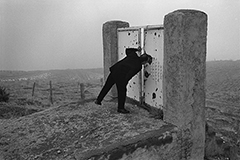 The International Federation of Film Critics (FIPRESCI), is a federation of national organizations and unions of professional film critics and independent journalists. Founded in June ۱۹۳۰ in Brussels, Belgium, this federation promotes and develops film culture and protects professional critics. There are members of FIPRESCI from more than fifty countries, and its awards are highly regarded at world-class film festivals such as Cannes, Berlin, Venice, Karlovy Vary, Locarno, San Sebastian, etc. Iran's independent cinema has won the FIPRESCI award many times at international film festivals so far. A variety of social, political, and cultural themes, along with the experience of new forms in filmmaking, have always attracted film critics' interest in Iranian independent cinema. The International Federation of Film Critics (FIPRESCI), is a federation of national organizations and unions of professional film critics and independent journalists. Founded in June ۱۹۳۰ in Brussels, Belgium, this federation promotes and develops film culture and protects professional critics. There are members of FIPRESCI from more than fifty countries, and its awards are highly regarded at world-class film festivals such as Cannes, Berlin, Venice, Karlovy Vary, Locarno, San Sebastian, etc. Iran's independent cinema has won the FIPRESCI award many times at international film festivals so far. A variety of social, political, and cultural themes, along with the experience of new forms in filmmaking, have always attracted film critics' interest in Iranian independent cinema.
-
29th Il Cinema Ritrovato Film Festival, Bologna (27 June - 4 July 2015)
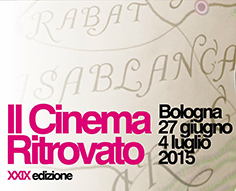 When film buffs talk passionately about a movie or a Film Festival, I always reserve some doubt! Sometimes the sentiments of some people toward films entangle with so much exaggerations that it seems far from reality. They call a fairly good film a masterpiece and a normal programming of a Festival, the best programming ever seen. And shame on you if they notice you didn’t go to a certain Festival, or you don’t know a certain genius filmmaker! I’m also referring to all the film buffs I knew who always talked admirably about Bologna Film Festival Cinema Rediscovered (Il Cinema Ritrovato). It was clear of course that it’s one of the most professional Festivals in the field of classical cinema. Now going there for the first time, it could be judged at first hand, the admirations of friends and relatives not as mere exaggeration that in fact, the atmosphere, programming and the quality of the films of this Festival are totally different from all I’ve ever seen before.
Talk about Bologna and its inhabitants could perhaps seem repetitive. This is a tiny beautiful and peaceful city, with cultured people, having the oldest university in Europe, and with students mostly from southern Italy; and yellow, orange or red colored buildings with long windows and spacious terraces, agreeable weather and famous foods… But it’s not bad to give a brief description of a Festival that tags like “Cinephiles’ Paradise” or “Cannes Festival of Classical Cinema” doesn’t really give an exact image of. It’s a Festival without any razzle-dazzle, showy opening and closing ceremonies, and strange outfits of its participants. Their audiences are the researchers, university professors, historians, students and generally the film lovers who go there for the films and cinema. In the city center where the... When film buffs talk passionately about a movie or a Film Festival, I always reserve some doubt! Sometimes the sentiments of some people toward films entangle with so much exaggerations that it seems far from reality. They call a fairly good film a masterpiece and a normal programming of a Festival, the best programming ever seen. And shame on you if they notice you didn’t go to a certain Festival, or you don’t know a certain genius filmmaker! I’m also referring to all the film buffs I knew who always talked admirably about Bologna Film Festival Cinema Rediscovered (Il Cinema Ritrovato). It was clear of course that it’s one of the most professional Festivals in the field of classical cinema. Now going there for the first time, it could be judged at first hand, the admirations of friends and relatives not as mere exaggeration that in fact, the atmosphere, programming and the quality of the films of this Festival are totally different from all I’ve ever seen before.
Talk about Bologna and its inhabitants could perhaps seem repetitive. This is a tiny beautiful and peaceful city, with cultured people, having the oldest university in Europe, and with students mostly from southern Italy; and yellow, orange or red colored buildings with long windows and spacious terraces, agreeable weather and famous foods… But it’s not bad to give a brief description of a Festival that tags like “Cinephiles’ Paradise” or “Cannes Festival of Classical Cinema” doesn’t really give an exact image of. It’s a Festival without any razzle-dazzle, showy opening and closing ceremonies, and strange outfits of its participants. Their audiences are the researchers, university professors, historians, students and generally the film lovers who go there for the films and cinema. In the city center where the...
-
11th Zurich International Film Festival(Sept.24-Oct.4, 2015)
 by Mohammad Mohammadian:
If you think that the same Zurich lovers, whom I wrote about last year, lured me once more to this city, you’re not totally wrong. But there are other reasons too. I’m going to a Festival that’s delightful and mature despite its very young age and at the same time there’s a famous actress whom I want to meet before coming back home. I’m talking about the same actress who said: “My becoming an actress was an accident; I didn’t plan it.”
This year I’m not a stranger at the Festival anymore: there’s a special section, New World View, devoted to Iranian Cinema. Last years it belonged to Turkish, Swedish, Brazilian and Indian Cinema, and this year, it is Iranian Cinema that shines through. Georg Butler, senior programmer of the Festival who knows Iranian cinema well, was present at 33th Fajr International Film Festival. He explains that this programming is because of the Iranian Cinema’s brilliant history, its young and talented filmmakers, and also the curiosity of the Swiss people for Iranian cinema. Corine Mauch, Zurich mayor, on the other hand, says that Iran’s opening towards the West after atomic energy negotiations is the main reason for this programming.
What’s the Time in Your World?, I’m not Angry, Fish and Cat, Wednesday 19 Ordibehesht, Atomic Heart, Nahid, Thirteen, Bright Day, Risk of Acid Rain, Paradise and some shorts and documentaries will be projected on this occasion. I’d even like to watch the ones I’ve seen before, in presence of Zurich audience. As usual the Iranian films have a very good reception here and after the projections, many people stay to participate in Q&A sessions with filmmakers. One of the most appreciated films in this section is Safi Yazdanian’s What’s the Time in Your World? The discussion about the film continues even out of theatre, in the street. Somebody says that after years in exile, I’ve seen a brilliant love story of Iranian cinema which gave me energy and made me nostalgic at the same time- it was so spellbinding that I didn’t want to leave the theatre.
... by Mohammad Mohammadian:
If you think that the same Zurich lovers, whom I wrote about last year, lured me once more to this city, you’re not totally wrong. But there are other reasons too. I’m going to a Festival that’s delightful and mature despite its very young age and at the same time there’s a famous actress whom I want to meet before coming back home. I’m talking about the same actress who said: “My becoming an actress was an accident; I didn’t plan it.”
This year I’m not a stranger at the Festival anymore: there’s a special section, New World View, devoted to Iranian Cinema. Last years it belonged to Turkish, Swedish, Brazilian and Indian Cinema, and this year, it is Iranian Cinema that shines through. Georg Butler, senior programmer of the Festival who knows Iranian cinema well, was present at 33th Fajr International Film Festival. He explains that this programming is because of the Iranian Cinema’s brilliant history, its young and talented filmmakers, and also the curiosity of the Swiss people for Iranian cinema. Corine Mauch, Zurich mayor, on the other hand, says that Iran’s opening towards the West after atomic energy negotiations is the main reason for this programming.
What’s the Time in Your World?, I’m not Angry, Fish and Cat, Wednesday 19 Ordibehesht, Atomic Heart, Nahid, Thirteen, Bright Day, Risk of Acid Rain, Paradise and some shorts and documentaries will be projected on this occasion. I’d even like to watch the ones I’ve seen before, in presence of Zurich audience. As usual the Iranian films have a very good reception here and after the projections, many people stay to participate in Q&A sessions with filmmakers. One of the most appreciated films in this section is Safi Yazdanian’s What’s the Time in Your World? The discussion about the film continues even out of theatre, in the street. Somebody says that after years in exile, I’ve seen a brilliant love story of Iranian cinema which gave me energy and made me nostalgic at the same time- it was so spellbinding that I didn’t want to leave the theatre.
...
-
Report on the 10th Zurich International Film Festival (September25-October5, 2014)
By: Mohammad Mohammadian
On a flight from Paris to Zurich and its Film Festival, I met an Iranian student, who majors in Environment at Zurich University. Soon after our meeting he said he knows cinema pretty well. “One of the most important things in movies is love,” he said, “but I’ve rarely seen a love that wholly and completely takes over the spirit of the audience. Even if there are some, they are not truly or deeply felt”. My examples didn’t convince him. So he added victoriously, “but in Zurich, you’re going to find out what I mean, you’re going to find out about love for yourself!”
At first, it seemed to me that with an old and experienced Festival like Locarno, and its open space Piazza Grande auditorium, Zurich would have little to say. But a few days into the Festival, there was a change and Zurich proved that in the first decade of its existence it has steadily grown among an ever widening circle of cinema goers. It established itself so rapidly that you can’t believe it’s only a ten years old Festival. The reasons for this success are easily identified. It certainly has something to do with impeccable management and programming, very enthusiastic audience, and good reception by the filmmakers from around the world in its past ten events. But add to these factors, the beauty of the city itself with its good seasonal weather, and perhaps that student’s enigmatic remark that I still couldn’t fully decipher!
Zurich is the largest and most populated city situated on the slopes of the Alps Mountains on north east of Switzerland. The city stretches on both sides of the Limmat River that flows out of Lake Zurich.
-
Report on the The 53rd Thessaloniki International Film Festival: Like Someone in Love!
By: Mohammad Mohammadian
:It was my second trip to Greece and Thessaloniki Film Festival. I had promised myself to go to each Festival only once. But last year something happened that changed my mind: Canadian Embassy despite Montreal World Film Festival’s invitation and hotdocs, refused to issue a visa. On the other hand, Thessaloniki, the most important Film Festival in east of Europe, undeterred by all the economical problems that Greece is entangled with, is held this year as usual and as organized as ever. That’s why I decided to forget about my vow and go to Greece!
-
Without Farewell…
 Ahmad Amini is a graduate of film directing from Tehran’s Art University who started his career in films by writing critiques. He made his first feature, Shadows of Invasion, in 1992 which was a Western-style movie about the war between Iran and Iraq. His credit was established after making four features. Without Farewell…is his fifth feature which he has directed after an eight-year interregnum. It is about personal life of a famous Iranian pop star, Reza Sadeqi. Sadeqi, who is paraplegic due to an oversight by his doctor in childhood has now chosen black shirt as his trademark and has many fans. Many Iranian producers have been planning to make a film on his personal life since many years ago. Mohammad Neshat was one of them who has been trying to get Sadeqi’s consent since two years ago. The film was first to be made by Kioumars Pourahmad (who had indicated his willingness to make a film about Iranian singers), but he was later replaced with Amini. Ahmad Amini is a graduate of film directing from Tehran’s Art University who started his career in films by writing critiques. He made his first feature, Shadows of Invasion, in 1992 which was a Western-style movie about the war between Iran and Iraq. His credit was established after making four features. Without Farewell…is his fifth feature which he has directed after an eight-year interregnum. It is about personal life of a famous Iranian pop star, Reza Sadeqi. Sadeqi, who is paraplegic due to an oversight by his doctor in childhood has now chosen black shirt as his trademark and has many fans. Many Iranian producers have been planning to make a film on his personal life since many years ago. Mohammad Neshat was one of them who has been trying to get Sadeqi’s consent since two years ago. The film was first to be made by Kioumars Pourahmad (who had indicated his willingness to make a film about Iranian singers), but he was later replaced with Amini.
-
The Orange Suit
 Veteran filmmaker, Dariush Mehrjui started to film his latest movie in October 2011 while his previous movie Beloved Sky has not been screened yet. The story of The Orange Suit is about a photographer who tries to purify his soul by keeping clean the city in which he lives. The color orange in the title of this film alludes to the color of the city cleaners’ outfit.
Mehrjui has written the screenplay of this film in collaboration with his wife Vahideh Mohammadifar who has also worked on the screenplays of Mehrjui’s other recent films. The main character is played by Hamed Behdad in his first experience of working with Mehrjui. Veteran filmmaker, Dariush Mehrjui started to film his latest movie in October 2011 while his previous movie Beloved Sky has not been screened yet. The story of The Orange Suit is about a photographer who tries to purify his soul by keeping clean the city in which he lives. The color orange in the title of this film alludes to the color of the city cleaners’ outfit.
Mehrjui has written the screenplay of this film in collaboration with his wife Vahideh Mohammadifar who has also worked on the screenplays of Mehrjui’s other recent films. The main character is played by Hamed Behdad in his first experience of working with Mehrjui.
-
"Snow on Pines"
 Peiman Mo’adi is famous for his parts in two of Asghar Farhadi’s films, About Elli (2009) and Nader and Simin: A Separation (2011). Before acting, he wrote screenplays for such films as Swan Song, Coma, Thirst, Wedding Dinner, and Café Setareh all of which were among bestsellers. Mo’adi has also made two short films and has started making his new feature, Snow on Pines, since late March. He is specifically interested in directing. He had set aside one of his screenplays, Hawk, for himself since many years ago, but the screenplay which reflected on social issues was turned down by Ministry of Culture and Islamic Guidance. Peiman Mo’adi is famous for his parts in two of Asghar Farhadi’s films, About Elli (2009) and Nader and Simin: A Separation (2011). Before acting, he wrote screenplays for such films as Swan Song, Coma, Thirst, Wedding Dinner, and Café Setareh all of which were among bestsellers. Mo’adi has also made two short films and has started making his new feature, Snow on Pines, since late March. He is specifically interested in directing. He had set aside one of his screenplays, Hawk, for himself since many years ago, but the screenplay which reflected on social issues was turned down by Ministry of Culture and Islamic Guidance.
-
"Kissing the Face of the Moon"
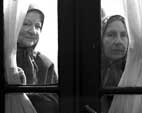 Homayoun As’adian made Gold and Cooper last year which drew a lot of critical acclaim. The idea for this eighth film has come from producer of Gold and Cooper, Manouchehr Mohammadian. This is the third film by As’adian after Gold and Cooper and Ten-Digits which is produced by Manouchehr Mohammadi. Production of Kissing the Face of the Moon started in early April and continued for 45 sessions. The screenplay has been written by As’adian. Unlike his past works which were about young people, the new film focuses on two old women who are neighbors and who have been waiting for 20 years for their sons to come back from the warfronts. Homayoun As’adian made Gold and Cooper last year which drew a lot of critical acclaim. The idea for this eighth film has come from producer of Gold and Cooper, Manouchehr Mohammadian. This is the third film by As’adian after Gold and Cooper and Ten-Digits which is produced by Manouchehr Mohammadi. Production of Kissing the Face of the Moon started in early April and continued for 45 sessions. The screenplay has been written by As’adian. Unlike his past works which were about young people, the new film focuses on two old women who are neighbors and who have been waiting for 20 years for their sons to come back from the warfronts.
-
"The Bear"
 Khosrow Ma’soumi started his film career with Meeting some 25 years ago. His most important work is a collection of films he has made on wood smuggling in northern Iranian forests: Tradition of Killing the Lovers (2002), A Faraway Place (2005) and The Wind Twists in the Meadow (2007). Excessive felling of trees in the Iranian forests is a major environmental concern which has sometimes turned criminal and forest guards have been killed by smugglers. Ma’soumi has focused on that violence in his films. His new work, The Bear, is his tenth feature which is also about the same subject. A young cleric who is also a carpenter has been away for many years during Iran-Iraq war. Back at his village, he is told that a wood smuggler nicknamed Bear has damaged his house. Khosrow Ma’soumi started his film career with Meeting some 25 years ago. His most important work is a collection of films he has made on wood smuggling in northern Iranian forests: Tradition of Killing the Lovers (2002), A Faraway Place (2005) and The Wind Twists in the Meadow (2007). Excessive felling of trees in the Iranian forests is a major environmental concern which has sometimes turned criminal and forest guards have been killed by smugglers. Ma’soumi has focused on that violence in his films. His new work, The Bear, is his tenth feature which is also about the same subject. A young cleric who is also a carpenter has been away for many years during Iran-Iraq war. Back at his village, he is told that a wood smuggler nicknamed Bear has damaged his house.
-
Documentary film channel
A documentary film channel was launched about a year ago, but increased both in quality and quantity from the beginning of the spring 2011. Documentary films followed no specific schedule in the Iranian TV and every channel had its own schedule, which sometimes included documentary items (that still continue). Channel 4, which is known as scientific channel and whose programs are special to the educated and specialist people, has been more focused on documentary films. The new channel, however, has made airing documentary films more regular. Based on opinion polls conducted by the channel, 80 percent of the audience has been satisfied with its programs.
-
Abbas Kiarostami Holds Photo Exhibition
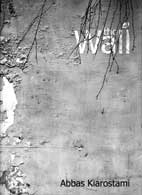 An exhibition of Abbas Kiarostami’s photos was held in May at Deh Gallery of Tehran with “wall” as the main theme. A book containing photos was also sold on the sidelines of the exhibition. Kiarostami had already held photo exhibitions on such subjects as snow, trees, roads, doors and rain-covered windows. He tries to discover new things in his photos. Under ordinary conditions, such photos may not attract attention. However, Kiarostami’s artistic work in recoding them has helped viewers to discover aesthetic elements which are usually hidden. For example, a concrete wall covered by shadows of tree leaves creates attractive contrast. The photos have been taken by Kiarostami in Iran, Italy, and France and have been, thus far, showcased in Canada and France. An exhibition of Abbas Kiarostami’s photos was held in May at Deh Gallery of Tehran with “wall” as the main theme. A book containing photos was also sold on the sidelines of the exhibition. Kiarostami had already held photo exhibitions on such subjects as snow, trees, roads, doors and rain-covered windows. He tries to discover new things in his photos. Under ordinary conditions, such photos may not attract attention. However, Kiarostami’s artistic work in recoding them has helped viewers to discover aesthetic elements which are usually hidden. For example, a concrete wall covered by shadows of tree leaves creates attractive contrast. The photos have been taken by Kiarostami in Iran, Italy, and France and have been, thus far, showcased in Canada and France.
-
Screening Foreign Films in Iran
 Public screening of foreign films has been very limited in Iran following the Islamic Revolution for two reasons. Firstly, most officials considered such films as being un-Islamic and immoral and incompatible with political model of the Iranian government. Secondly, screening foreign films would have barred people from watching Iranian movies and this would have damaged the nascent post-revolution cinema. Therefore, government swayed monopoly over purchasing and screening foreign films, but that policy has also waxed and waned in the past three decades. Public screening of foreign films has been very limited in Iran following the Islamic Revolution for two reasons. Firstly, most officials considered such films as being un-Islamic and immoral and incompatible with political model of the Iranian government. Secondly, screening foreign films would have barred people from watching Iranian movies and this would have damaged the nascent post-revolution cinema. Therefore, government swayed monopoly over purchasing and screening foreign films, but that policy has also waxed and waned in the past three decades.
-
Three bears for one film
 Since About Elli, which was made by Asghar Farhadi two years ago, had won a silver bear for the best directing from Berlin Film Festival, many people looked forward to seeing the achievement of his next film, Nader and Simin: A Separation, in the 61st edition of the same festival. Few, however, expected so many prizes that it actually won: a golden bear for the best film, a silver bear for the actor and another silver bear for the actress. This proved that Farhadi’s new film had greatly appealed to Berlin Film Festival’s jury. Farhadi did not expect the foreign audience to understand the film as Iranians do because parts of it are based on pure Iranian customs and beliefs. However, the totally human idea which formed the core of the movie greatly appealed to both the judges and festival’s directors. Nader and Simin: A Separation also won many prizes from Fajr International Film Festival. Since About Elli, which was made by Asghar Farhadi two years ago, had won a silver bear for the best directing from Berlin Film Festival, many people looked forward to seeing the achievement of his next film, Nader and Simin: A Separation, in the 61st edition of the same festival. Few, however, expected so many prizes that it actually won: a golden bear for the best film, a silver bear for the actor and another silver bear for the actress. This proved that Farhadi’s new film had greatly appealed to Berlin Film Festival’s jury. Farhadi did not expect the foreign audience to understand the film as Iranians do because parts of it are based on pure Iranian customs and beliefs. However, the totally human idea which formed the core of the movie greatly appealed to both the judges and festival’s directors. Nader and Simin: A Separation also won many prizes from Fajr International Film Festival.
-
Battle on Facebook
 Every new year in Iran starts with spring and a celebration called Norouz. Film screening in Norouz is of high importance because there is high enthusiasm among people to go to movie theaters because of long holidays. The two top items on spring screening list this year included The Deportees 3 (Massoud Dehnamaki) and Nader and Simin: A Separation (Asghar Farhadi). The Deportees 1, which had been already screened in Norouz holidays, was the bestselling movie in the whole history of the Iranian cinema. High sales of the second episode had increased hope that the third episode would be also a blockbuster. The Deportees trilogy is about a group of hoodlums, thieves and addicts who go to the warfronts with Iraq in the first episode. In the second episode, they are taken into captivity by Iraqis and in the third episode they get involved in presidential election. Every new year in Iran starts with spring and a celebration called Norouz. Film screening in Norouz is of high importance because there is high enthusiasm among people to go to movie theaters because of long holidays. The two top items on spring screening list this year included The Deportees 3 (Massoud Dehnamaki) and Nader and Simin: A Separation (Asghar Farhadi). The Deportees 1, which had been already screened in Norouz holidays, was the bestselling movie in the whole history of the Iranian cinema. High sales of the second episode had increased hope that the third episode would be also a blockbuster. The Deportees trilogy is about a group of hoodlums, thieves and addicts who go to the warfronts with Iraq in the first episode. In the second episode, they are taken into captivity by Iraqis and in the third episode they get involved in presidential election.
-
Nader’s Separation form Simin
 Asghar Farhadi is creditable Iranian director and every film made by him can be a prominent event in the Iranian cinema. He started his career in television and stage plays by making attractive series who established him as a new talent. His first feature, Dance in the Dust, cast Faramarz Qaribian and was greatly welcomed at that year’s Fajr International Film Festival, though the welcome was not overwhelming. He then made Shahr-e Ziba casting Taraneh Alidousti which revealed other angles of his creativity and art. The important point about both films was his lack of interest in commonplace themes. He usually opted for attractive and novel motifs. His third film, Fireworks Wednesday, which cast Hedyeh Tehrani proved that he has come of age and nobody could doubt his directing abilities anymore. About Elli has been the pinnacle of his professional career about which many critiques have been written in the past two years. Nader’s Separation form Simin is the name of his new film which is about a young couple going to get divorced until a surprise event brings them close. Asghar Farhadi is creditable Iranian director and every film made by him can be a prominent event in the Iranian cinema. He started his career in television and stage plays by making attractive series who established him as a new talent. His first feature, Dance in the Dust, cast Faramarz Qaribian and was greatly welcomed at that year’s Fajr International Film Festival, though the welcome was not overwhelming. He then made Shahr-e Ziba casting Taraneh Alidousti which revealed other angles of his creativity and art. The important point about both films was his lack of interest in commonplace themes. He usually opted for attractive and novel motifs. His third film, Fireworks Wednesday, which cast Hedyeh Tehrani proved that he has come of age and nobody could doubt his directing abilities anymore. About Elli has been the pinnacle of his professional career about which many critiques have been written in the past two years. Nader’s Separation form Simin is the name of his new film which is about a young couple going to get divorced until a surprise event brings them close.
-
Paternal House
 Kiyanoush Ayyari is among seasoned, stylist Iranian directors whose career started before the Islamic Revolution by taking part in “free cinema” current. It was a progressive, though amateur, current whose directors started to make 8-mm films in order to oppose commercial films. A number of currently famous Iranian directors hailed from that generation with the most prominent of them being Ayyari. Ayyari introduced the modern Iranian cinema to the world by making such films as Across the Fire in 1980s and his works along with those of Amir Naderi, Abbas Kiarostami, and Mohsen Makhmalbaf were among the first Iranian films to take part in renowned international festivals. Ayyari makes few films, but has his own style. His To Be or Not to Be, which he produced with no famous actors and on low budget in the late 1990s has been considered by many film critics as one of his best and most artistic works. Thereafter, his films have not found their way onto the public screens. The Iranian Spread, which was a tribute to various Iranian cultures, faced many production problems and was never screened. Kiyanoush Ayyari is among seasoned, stylist Iranian directors whose career started before the Islamic Revolution by taking part in “free cinema” current. It was a progressive, though amateur, current whose directors started to make 8-mm films in order to oppose commercial films. A number of currently famous Iranian directors hailed from that generation with the most prominent of them being Ayyari. Ayyari introduced the modern Iranian cinema to the world by making such films as Across the Fire in 1980s and his works along with those of Amir Naderi, Abbas Kiarostami, and Mohsen Makhmalbaf were among the first Iranian films to take part in renowned international festivals. Ayyari makes few films, but has his own style. His To Be or Not to Be, which he produced with no famous actors and on low budget in the late 1990s has been considered by many film critics as one of his best and most artistic works. Thereafter, his films have not found their way onto the public screens. The Iranian Spread, which was a tribute to various Iranian cultures, faced many production problems and was never screened.
-
24 and Prison Break in Iran
 24 and Prison Break are foreign series with many fans in Iran. Their downloaded copies were already everywhere before some private institutes decided to supply them in an official and legal form. Thus, filmmaking institutes supplying material to home video network (on CDs or DVDs) entered into a competition to get a permit for supplying those series. They were finally supplied in Iran and were received enthusiastically by people. The best and most common way for supplying foreign films and series is still dubbing them into Persian. Therefore, a group of experienced dubbing artists came together to do the job. Nobody actually thought that a series like 24, which is about anti-spy and anti-terrorist activities of the US government would be permitted in Iran, but that has actually happened. Of course, the measure came under serious fire from traditional circles. 24 and Prison Break are the most suitable series for Iran in terms of actresses’ costumes. 24 and Prison Break are foreign series with many fans in Iran. Their downloaded copies were already everywhere before some private institutes decided to supply them in an official and legal form. Thus, filmmaking institutes supplying material to home video network (on CDs or DVDs) entered into a competition to get a permit for supplying those series. They were finally supplied in Iran and were received enthusiastically by people. The best and most common way for supplying foreign films and series is still dubbing them into Persian. Therefore, a group of experienced dubbing artists came together to do the job. Nobody actually thought that a series like 24, which is about anti-spy and anti-terrorist activities of the US government would be permitted in Iran, but that has actually happened. Of course, the measure came under serious fire from traditional circles. 24 and Prison Break are the most suitable series for Iran in terms of actresses’ costumes.
-
Rescreening old memorable films
 There is serious concern about people having lost their appetite for watching movies at theaters which has brought the Iranian cinema close to bankruptcy. Theater owners are therefore, looking for ways to draw people to theaters, but this has failed with most Iranian films. Therefore, new methods have been tested. Apart from screening soccer matched at theaters, a number of theater owners have submitted a plan to state officials to rescreen a number of memorable films of the past. They argued that new films were not attractive enough to motivate people, but memorable films aroused a sense of nostalgia and could get people to watch them at movie theaters. The list they had offered the Ministry of Culture and Islamic Guidance included such names as Mother (Ali Hatami), Hamoon (Dariush Mehrjui), Captain Khorshid (Nasser Taqvai), The Love-Stricken (Hatami) and many other films produced in the 1980s and 1990s. There is serious concern about people having lost their appetite for watching movies at theaters which has brought the Iranian cinema close to bankruptcy. Theater owners are therefore, looking for ways to draw people to theaters, but this has failed with most Iranian films. Therefore, new methods have been tested. Apart from screening soccer matched at theaters, a number of theater owners have submitted a plan to state officials to rescreen a number of memorable films of the past. They argued that new films were not attractive enough to motivate people, but memorable films aroused a sense of nostalgia and could get people to watch them at movie theaters. The list they had offered the Ministry of Culture and Islamic Guidance included such names as Mother (Ali Hatami), Hamoon (Dariush Mehrjui), Captain Khorshid (Nasser Taqvai), The Love-Stricken (Hatami) and many other films produced in the 1980s and 1990s.
-
Ethnic and Guild-related Protests to Films and Series
 Iran is blessed with a variety of ethnic groups, cultures, and dialects each accompanied with special costumes and lifestyle. Such fragmentation has sometimes pitched various ethnicities against each other. People living in various regions sometimes think their ethnic identity is something different from their national identity. People of Azarbaijan, for example, consider themselves to be Turks rather than Persians and are very sensitive to all kind of jokes, gests or any other thing which may question originality of their culture and language one way or another. That sensitive has been also reflected in their films and books. That is, if a Turk character does something improper or is depicted in an unsuitable way in a film or series, they will protest to having been misrepresented! Perhaps, it will be quite funny for a European or an American citizen to know about such prejudices, which are also extended into occupations and various guilds. Iran is blessed with a variety of ethnic groups, cultures, and dialects each accompanied with special costumes and lifestyle. Such fragmentation has sometimes pitched various ethnicities against each other. People living in various regions sometimes think their ethnic identity is something different from their national identity. People of Azarbaijan, for example, consider themselves to be Turks rather than Persians and are very sensitive to all kind of jokes, gests or any other thing which may question originality of their culture and language one way or another. That sensitive has been also reflected in their films and books. That is, if a Turk character does something improper or is depicted in an unsuitable way in a film or series, they will protest to having been misrepresented! Perhaps, it will be quite funny for a European or an American citizen to know about such prejudices, which are also extended into occupations and various guilds.
-
Crisis in Directors Society
 Iranian Directors Society is an influential component of the House of Cinema. Almost all Iranian directors are its members and managing director of House of Cinema is usually one of them. On the other hand, the Society has remained influential as it stays away from controversies. Directors Society has been seldom scene of a major crisis during about 30 years which have passed since the establishment of House of Cinema. Alireza Raeisian, the seasoned Iranian filmmaker was heading the Society for 12 years and did his best to turn it into an independent entity. He has been the most lasting manager of a cinema guild in House of Cinema and has been able to get the highest votes during various voting sessions. The new term of Raeisian was accompanied with a strange turn of events. Iranian Directors Society is an influential component of the House of Cinema. Almost all Iranian directors are its members and managing director of House of Cinema is usually one of them. On the other hand, the Society has remained influential as it stays away from controversies. Directors Society has been seldom scene of a major crisis during about 30 years which have passed since the establishment of House of Cinema. Alireza Raeisian, the seasoned Iranian filmmaker was heading the Society for 12 years and did his best to turn it into an independent entity. He has been the most lasting manager of a cinema guild in House of Cinema and has been able to get the highest votes during various voting sessions. The new term of Raeisian was accompanied with a strange turn of events.
-
Home Video Network
 Up to almost a decade ago, old Iranian and foreign films was the only thing which was supplied through home video network, which were offered on CDs. People were not willing to watch them as they had been produced years ago and their choice was not interesting to film buffs. Publicity for the network was so unremarkable that people mostly ignored such products. The situation was the same until Visual Media Institute came into being to take charge of distributing films through a totally new process. This allowed for more Iranian and foreign films to enter the network and publicity became more orderly. Since three years ago, they bought licenses for distributing feature films as their public screening ended and those films went into people’s homes on CDs or DVDs shortly after public screening. Up to almost a decade ago, old Iranian and foreign films was the only thing which was supplied through home video network, which were offered on CDs. People were not willing to watch them as they had been produced years ago and their choice was not interesting to film buffs. Publicity for the network was so unremarkable that people mostly ignored such products. The situation was the same until Visual Media Institute came into being to take charge of distributing films through a totally new process. This allowed for more Iranian and foreign films to enter the network and publicity became more orderly. Since three years ago, they bought licenses for distributing feature films as their public screening ended and those films went into people’s homes on CDs or DVDs shortly after public screening.
-
Dubbing Day
 Dubbing is an important component of the Iranian cinema. Since many decades ago, foreign films were dubbed into Persian and moviegoers were very painstaking about quality of dubbing. Perhaps, this is why dubbing is more prosperous in Iran than other countries. Since mid-1980s when on-the-set sound recording became vogue, few films were dubbed for movie theaters, but foreign films are still dubbed before presented in video clubs on CDs or DVDs. The state television also dubs foreign films and series and there is a special unit for dubbing films in television where most experienced dubbing artists are working. Dubbing is an important component of the Iranian cinema. Since many decades ago, foreign films were dubbed into Persian and moviegoers were very painstaking about quality of dubbing. Perhaps, this is why dubbing is more prosperous in Iran than other countries. Since mid-1980s when on-the-set sound recording became vogue, few films were dubbed for movie theaters, but foreign films are still dubbed before presented in video clubs on CDs or DVDs. The state television also dubs foreign films and series and there is a special unit for dubbing films in television where most experienced dubbing artists are working.
-
Majid Majidi’s New Film about Prophet Mohammad (PBUH)
 Following production of an costly television series on Prophet Joseph and after Ahmad Reza Darvish started to make a film on Ashura (the day Imam Hossein was martyred), Majid Majidi is now the third Iranian director to have indicated his willingness to make a film about a saint. His project can be the most controversial as it is about the life of Prophet Mohammad (PBUH). No such film has been ever made about the character of Prophet Mohammad (PBUH) and Moustapha Akkad’s The Message did not depict the Prophet Mohammad (PBUH). Majidi’s latest work, Song of the Sparrows, was made three years ago and won best actor prize of Berlin Film Festival. Majidi broke the news about his new film after receiving Ibn Arabi medal in Murcia, Spain. Following production of an costly television series on Prophet Joseph and after Ahmad Reza Darvish started to make a film on Ashura (the day Imam Hossein was martyred), Majid Majidi is now the third Iranian director to have indicated his willingness to make a film about a saint. His project can be the most controversial as it is about the life of Prophet Mohammad (PBUH). No such film has been ever made about the character of Prophet Mohammad (PBUH) and Moustapha Akkad’s The Message did not depict the Prophet Mohammad (PBUH). Majidi’s latest work, Song of the Sparrows, was made three years ago and won best actor prize of Berlin Film Festival. Majidi broke the news about his new film after receiving Ibn Arabi medal in Murcia, Spain.
-
Iranian Cinema in the 28th Fajr Film Festival
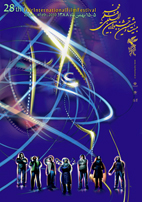 This year the Fajr Film Festival will be held from 25 January to 4 February as the Iranian society has been witness to some political debates and social unrest. This is the first major cultural event following June 2009 presidential election, although government managers have been planning it since a long time ago. For the fist time this year, film critics and reporters are going to watch the films at a public venue along with film directors and foreign visitors. This year the Fajr Film Festival will be held from 25 January to 4 February as the Iranian society has been witness to some political debates and social unrest. This is the first major cultural event following June 2009 presidential election, although government managers have been planning it since a long time ago. For the fist time this year, film critics and reporters are going to watch the films at a public venue along with film directors and foreign visitors.
-
Actors’ Salaries
In early fall, a report was broadcast in a popular new program of the Iranian television about “chaotic situation of actor’s salaries.” The figure announced in that program about salaries paid to actors elicited different reactions. Some of those actors denied having been paid those salaries and other remained silent. A major question was posed about the source of that information. In Iran, the content of contracts signed between producers and actors are not usually made public and nobody is aware of the exact salaries of actors. It is possible to guess who earns more, but no accurate figure had been given up to that time.
-
26th Short Film Festival
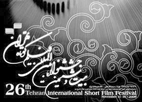 Tehran Short Film Festival is one of the most purposeful festivals held in Iran. it is a venue for screening a selection of short films produced in the course of the year. Since short films cannot be screened at movie theaters, the festival is the best opportunity for watching films made by young directors. During the current year, Nasser Gholamrezaei (director), Ensiyeh Shah-Hosseini (director), Mohammad Dormanesh (director), Saeed Mostaghasi (film critic), and Kaveh Bahrami-Moqaddam (short film director) selected films and a jury consisting of Mehrdad Oskui (documentarian), Mohammad Reza Aslani (director), Mohammad Reza Arab (director), Abdollah Alimorad (animator), Mohammad Gabrlou (film critic), Ahmad Reza Garshasebi (director) and Mahnaz Mazaheri (arts expert) judged the films. Tehran Short Film Festival is one of the most purposeful festivals held in Iran. it is a venue for screening a selection of short films produced in the course of the year. Since short films cannot be screened at movie theaters, the festival is the best opportunity for watching films made by young directors. During the current year, Nasser Gholamrezaei (director), Ensiyeh Shah-Hosseini (director), Mohammad Dormanesh (director), Saeed Mostaghasi (film critic), and Kaveh Bahrami-Moqaddam (short film director) selected films and a jury consisting of Mehrdad Oskui (documentarian), Mohammad Reza Aslani (director), Mohammad Reza Arab (director), Abdollah Alimorad (animator), Mohammad Gabrlou (film critic), Ahmad Reza Garshasebi (director) and Mahnaz Mazaheri (arts expert) judged the films.
-
5th Parvin Film Festival
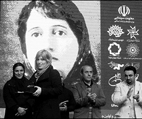 Parvin Film Festival which is named after the famous Iranian moralistic poet, Parvin E’tesami, is also special to women (like Kowsar Film Festival). Here, female directors can screen their works and their male counterparts can also bring their works on women. Its main difference with Kowsar Film Festival was its international scope which included films from Sweden, Germany and UK. A subsidiary section was special to a poll conducted on 130 cultural and artistic figures of Iran who were asked to choose the best film on women in history of the Iranian cinema. Parvin Film Festival which is named after the famous Iranian moralistic poet, Parvin E’tesami, is also special to women (like Kowsar Film Festival). Here, female directors can screen their works and their male counterparts can also bring their works on women. Its main difference with Kowsar Film Festival was its international scope which included films from Sweden, Germany and UK. A subsidiary section was special to a poll conducted on 130 cultural and artistic figures of Iran who were asked to choose the best film on women in history of the Iranian cinema.
-
Iranian Cinema Celebration
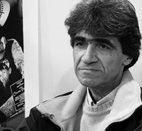 The Iranian Cinema Celebration is held annually on the national Cinema Day. First, a jury reviews films long before the celebration and the selected ones are introduced during the Iranian Cinema Celebration. It has gradually become a rival event for Fajr International Film Festival, so that, prizes dispensed at both events are of the same importance to filmmakers. The celebration is also a gathering of cinema guilds with government playing the least part in its organization. During the current year, however, developments related to the 10th presidential election disrupted the annual event. Farhad Tohidi, the renowned Iranian screenwriter who was secretary of this year’s Iranian Cinema Celebration, had announced two months earlier (in late summer) that since films have been delivered belatedly and jury members are not willing to go through them, the celebration could not be held on schedule. While everybody believed that there would be no celebration during the current year, an official statement released by the House of Cinema announced that it would be held in a different way. The Iranian Cinema Celebration is held annually on the national Cinema Day. First, a jury reviews films long before the celebration and the selected ones are introduced during the Iranian Cinema Celebration. It has gradually become a rival event for Fajr International Film Festival, so that, prizes dispensed at both events are of the same importance to filmmakers. The celebration is also a gathering of cinema guilds with government playing the least part in its organization. During the current year, however, developments related to the 10th presidential election disrupted the annual event. Farhad Tohidi, the renowned Iranian screenwriter who was secretary of this year’s Iranian Cinema Celebration, had announced two months earlier (in late summer) that since films have been delivered belatedly and jury members are not willing to go through them, the celebration could not be held on schedule. While everybody believed that there would be no celebration during the current year, an official statement released by the House of Cinema announced that it would be held in a different way.
-
Iranian Filmmakers in US
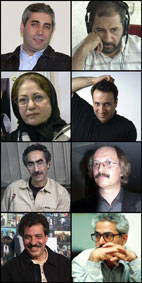 A visit to Iran by Board members of Academy of Motion Pictures Arts and Sciences (Oscar) in early spring was among the most important artistic developments in the country. It was important because since the victory of the Islamic Revolution, no American artist had officially travelled to Iran. The trip was surrounded by controversies and although it provided a good ground for cultural interactions between the two countries’ filmmakers, some circles protested to it. During the visit, two specialized meetings were held attended by Oscar Board members and Iranian filmmakers, which greatly echoed in the Iranian print media. The American visitors also toured some ancient Iranian cities. Back in the United States, they talked about hospitality of Iranians and positive results of their trip. Almost six months after that trip, the American group invited 10 Iranian filmmakers to visit the United States to get abreast of filmmaking conditions and facilities in that country. A visit to Iran by Board members of Academy of Motion Pictures Arts and Sciences (Oscar) in early spring was among the most important artistic developments in the country. It was important because since the victory of the Islamic Revolution, no American artist had officially travelled to Iran. The trip was surrounded by controversies and although it provided a good ground for cultural interactions between the two countries’ filmmakers, some circles protested to it. During the visit, two specialized meetings were held attended by Oscar Board members and Iranian filmmakers, which greatly echoed in the Iranian print media. The American visitors also toured some ancient Iranian cities. Back in the United States, they talked about hospitality of Iranians and positive results of their trip. Almost six months after that trip, the American group invited 10 Iranian filmmakers to visit the United States to get abreast of filmmaking conditions and facilities in that country.
-
Iranian Cinema Dinner Banquet
The 13th Iranian Cinema Celebration was canceled. Although Farhad Towhidi (screenwriter and deputy director of House of Cinema) had been assigned as secretary of the celebration since many months ago and, as usual, the best works of the Iranian cinema were to be chosen in various fields, developments following presidential election caused directorate of House of Cinema to announce that it was not ready to mark the occasion. Every year, a celebration is held on September 12, which is the national Cinema Day in Iran, in which judges give their final views on the last year’s movies and selected participants receive special statue of the celebration. The celebration has turned into the main rival for Fajr International Film Festival in recent years.
-
CIFEJ in Tehran
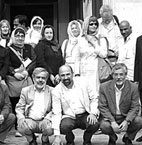 Tehran played host to a meeting of CIFEJ (Centre International de Film pour l'enfance et La Jeunesse) board of directors on April 18-23. Mohsen Chiniforoushan, managing director of the Institute for the Intellectual Development of Children and Young Adults and vice president of CIFEJ, announced that in a meeting which was held in Taiwan in the middle of July, Iran’s proposal to move central office of the organization to Tehran had been discussed. During 54 years of activity, CIFEJ has been based in Canada and France. Apart from Iran, other countries including Germany and Taiwan are willing to host CIFEJ. Tehran played host to a meeting of CIFEJ (Centre International de Film pour l'enfance et La Jeunesse) board of directors on April 18-23. Mohsen Chiniforoushan, managing director of the Institute for the Intellectual Development of Children and Young Adults and vice president of CIFEJ, announced that in a meeting which was held in Taiwan in the middle of July, Iran’s proposal to move central office of the organization to Tehran had been discussed. During 54 years of activity, CIFEJ has been based in Canada and France. Apart from Iran, other countries including Germany and Taiwan are willing to host CIFEJ.
-
Directors’ Night
Every year, a number of cinema guilds in Iran (like directors, actors, and critics) hold a ceremony to report on annual performance of their respective guilds and to pay tribute to their prominent members. This was the rule up to last year. This year, however, the death of the late Iranian director, Seifollah Dad, overshadowed the event and a major part of the ceremony was special to his commemoration. Dad was very influential in the establishment of film associations and during his term as deputy minister of culture for cinema affairs he took basic steps to support filmmakers. Therefore, he is constantly mentioned as one of the best cultural authorities of post-revolution era. During directors’ night, Mehdi Karampour, Mohammad Ali Najafi, Alireza Davoudnejad, and Mohammad Mehdi Asgarpour addressed the audience on the personality of Seifollah Dad.
-
Jumong in Iran
 The Iranian state television has many considerations when purchasing and broadcasting foreign series the most important of which is how actresses are clothed. Therefore, historical productions of Australia and Canada have been favorites of the Iranian television because female characters are suitably clad. The second criterion is that their subjects should not be against religious and moral rules of the Iranian society. About two decades ago, a Japanese series was aired on the television in which the main character was followed from childhood up to her death. It was greatly welcomed by Iranians and made state television a regular customer of oriental series. In addition to Japanese series, television productions of South Korea have been also on the list. The Iranian state television has many considerations when purchasing and broadcasting foreign series the most important of which is how actresses are clothed. Therefore, historical productions of Australia and Canada have been favorites of the Iranian television because female characters are suitably clad. The second criterion is that their subjects should not be against religious and moral rules of the Iranian society. About two decades ago, a Japanese series was aired on the television in which the main character was followed from childhood up to her death. It was greatly welcomed by Iranians and made state television a regular customer of oriental series. In addition to Japanese series, television productions of South Korea have been also on the list.
-
Roaming in the Mist
 Bahram Tavakkoli is among young Iranian directors who have started with making short films. Before making his first feature, Barefoot in Paradise, he had become renowned for his short films. His first film was about a religious person who voluntarily enters a quarantine center of AIDS patients to assist its staff. When facing a number of patients and befriending them, he doubts his own beliefs. This film won a number of main prizes after its first screening in Fajr Festival. Three years later, Tavakkoli has made his second feature on the basis of a different story. Roaming in the Mist is about a young composer who marries his beloved woman; a stage performer. Following marriage, they face many problems which cause the man to lose his job. His wife also leaves him. Shahab Hosseini and Leila Hatami have been cast in the main roles; they were chosen as the best actor and actress in the latest edition of Fajr Festival. Bahram Tavakkoli is among young Iranian directors who have started with making short films. Before making his first feature, Barefoot in Paradise, he had become renowned for his short films. His first film was about a religious person who voluntarily enters a quarantine center of AIDS patients to assist its staff. When facing a number of patients and befriending them, he doubts his own beliefs. This film won a number of main prizes after its first screening in Fajr Festival. Three years later, Tavakkoli has made his second feature on the basis of a different story. Roaming in the Mist is about a young composer who marries his beloved woman; a stage performer. Following marriage, they face many problems which cause the man to lose his job. His wife also leaves him. Shahab Hosseini and Leila Hatami have been cast in the main roles; they were chosen as the best actor and actress in the latest edition of Fajr Festival.
-
Whisper with the Wind
 After The Wind Will Carry Us (Abbas Kiarostami), whose story went on in the Iranian Kordestan, Iranian filmmakers were attracted to what happened in that region after the fall of Saddam. Samira Makhmalbaf made The Blackboards and later on, local filmmakers started professional careers. One of the most famous of the latter group was Bahman Qobadi, whose first feature called A Time for the Drunken Horses, won a Camera d’Or from Cannes Film Festival. The trend has continued. Shahram Alidi is another Kurd director of Iran whose first feature, Whisper with the Wind, has taken part in Cannes and won two prizes from non-competitive sections. Alidi has already made many short films and has won prizes from domestic festivals. After The Wind Will Carry Us (Abbas Kiarostami), whose story went on in the Iranian Kordestan, Iranian filmmakers were attracted to what happened in that region after the fall of Saddam. Samira Makhmalbaf made The Blackboards and later on, local filmmakers started professional careers. One of the most famous of the latter group was Bahman Qobadi, whose first feature called A Time for the Drunken Horses, won a Camera d’Or from Cannes Film Festival. The trend has continued. Shahram Alidi is another Kurd director of Iran whose first feature, Whisper with the Wind, has taken part in Cannes and won two prizes from non-competitive sections. Alidi has already made many short films and has won prizes from domestic festivals.
-
The Man Who Ate His Cherries
 This is about a man who works for a low salary at a tire manufacturing company. The court has condemned him to pay his wife’s marriage portion and Reza is trying to get that money. Finally, he remembers that another worker had lost a finger in work and this gives him a new idea how to make that money. Peiman Haqqani, the director, is not a known figure in the Iranian cinema. He is interested in independent cinema and his first feature was in black and white. It is clear that The Man Who Ate His Cherries has not been made for public screening in Iran and production costs have been kept down. Such films are not usually accompanied with much ado and nobody is very sensitive about following news on independent films save for those which are made by a famous director. This is about a man who works for a low salary at a tire manufacturing company. The court has condemned him to pay his wife’s marriage portion and Reza is trying to get that money. Finally, he remembers that another worker had lost a finger in work and this gives him a new idea how to make that money. Peiman Haqqani, the director, is not a known figure in the Iranian cinema. He is interested in independent cinema and his first feature was in black and white. It is clear that The Man Who Ate His Cherries has not been made for public screening in Iran and production costs have been kept down. Such films are not usually accompanied with much ado and nobody is very sensitive about following news on independent films save for those which are made by a famous director.
-
Seven Questions for the Next President
House of Cinema, which is the most important nongovernmental guild institution, has posed seven basic questions to presidential candidates on the eve of the 10th presidential election and has asked about their viewpoints on cinema. This is the first time that a nongovernmental institution is inquiring about presidential candidates’ programs. Since the lion’s share of cinema budget is provided by the government and Ministry of Culture and Islamic Guidance and the Iranian cinema is managed by one of the departments of that ministry, answers given by candidates will be taken as their official statement on cinema.
-
The Expelled 2, Number One Bestseller of the Iranian Cinema
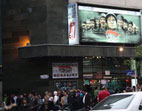 Two groups are influential in public screening of Iranian films: owners of movie theaters and Screening Guild Council. When Ministry of Culture and Islamic Guidance issues screening permits for films (which have no legal or censorship problems) theater owners sign contracts with their producers to screen their films according to a schedule. Screening Guild Council determines regulations as well as the schedule. Its members are producers, directors and theater owners. There are six groups of theaters in Tehran and each group includes a number of movie theaters every one of which is told to screen a certain film and it is not customary for movie theaters to screen every film that they want. Duration of screening also depends on box office returns. If a film sells lower than the standards, it may be taken off the screen in a matter of two weeks. Two groups are influential in public screening of Iranian films: owners of movie theaters and Screening Guild Council. When Ministry of Culture and Islamic Guidance issues screening permits for films (which have no legal or censorship problems) theater owners sign contracts with their producers to screen their films according to a schedule. Screening Guild Council determines regulations as well as the schedule. Its members are producers, directors and theater owners. There are six groups of theaters in Tehran and each group includes a number of movie theaters every one of which is told to screen a certain film and it is not customary for movie theaters to screen every film that they want. Duration of screening also depends on box office returns. If a film sells lower than the standards, it may be taken off the screen in a matter of two weeks.
-
Anahita
 Anahita is the name of ancient Iranian goddess of water and fertility. Relying on that myth, Azizollah Hamidnejad, the famous Iranian director who has made some good films about Iran-Iraq war, has made a different film. It is the story of a group of students who come across new facts when working on water molecules. Hoor on Fire is one of the most remarkable films of Hamidnejad who brought him many prizes and made him famous. His later works like The Tear of the Cold were also welcomed by critics. Main advantages of his films include believable stories and good performances. He has cast Mitra Hajjar in the main role as Anahita. She left for France five years ago and has not appeared in any Iranian film since then. This will be her first experience after her return to Iran. Crewmembers include Farshad Mohammadi (director of photography), Mahmoud Khorsand (sound recordist), Behzad Kazzazi (production designer), and Kourosh Alizadeh (makeup artist). Main actors include Shahab Hosseini, Narges Mohammadi, Maryam Soltani, Afsaneh Nasseri, Mohammad Reza Davoudnejad, and Pourya Poursorkh. Hamidnejad has noted that Anahita is an actor-based and subject-based story full of riddles. It combines romantic and mystic motifs. Anahita is the name of ancient Iranian goddess of water and fertility. Relying on that myth, Azizollah Hamidnejad, the famous Iranian director who has made some good films about Iran-Iraq war, has made a different film. It is the story of a group of students who come across new facts when working on water molecules. Hoor on Fire is one of the most remarkable films of Hamidnejad who brought him many prizes and made him famous. His later works like The Tear of the Cold were also welcomed by critics. Main advantages of his films include believable stories and good performances. He has cast Mitra Hajjar in the main role as Anahita. She left for France five years ago and has not appeared in any Iranian film since then. This will be her first experience after her return to Iran. Crewmembers include Farshad Mohammadi (director of photography), Mahmoud Khorsand (sound recordist), Behzad Kazzazi (production designer), and Kourosh Alizadeh (makeup artist). Main actors include Shahab Hosseini, Narges Mohammadi, Maryam Soltani, Afsaneh Nasseri, Mohammad Reza Davoudnejad, and Pourya Poursorkh. Hamidnejad has noted that Anahita is an actor-based and subject-based story full of riddles. It combines romantic and mystic motifs.
-
Tehran, Tehran
 Cinema is one of the most effective means to promote a commodity or product, which can be a detergent, an automobile, or a big island like Kish. The ordering party can be a company or a state-run institution. Short films by famous Iranian directors about Kish were first made in mid-1990s under direct supervision of Mohsen Makhmalbaf (who lived in Iran at that time) and some of them were even screened in Cannes. Similar projects followed, the most important of which was a collection about the Iranian carpet made by different directors under supervision of Reza Mirkarimi. Now, Tehran Municipality has invited three directors from three generations to make films about Tehran. Dariush Mehrjui belongs to the first generation while Seifollah Dad and Mehdi Karampour represent the second and third generations. Cinema is one of the most effective means to promote a commodity or product, which can be a detergent, an automobile, or a big island like Kish. The ordering party can be a company or a state-run institution. Short films by famous Iranian directors about Kish were first made in mid-1990s under direct supervision of Mohsen Makhmalbaf (who lived in Iran at that time) and some of them were even screened in Cannes. Similar projects followed, the most important of which was a collection about the Iranian carpet made by different directors under supervision of Reza Mirkarimi. Now, Tehran Municipality has invited three directors from three generations to make films about Tehran. Dariush Mehrjui belongs to the first generation while Seifollah Dad and Mehdi Karampour represent the second and third generations.
-
Trial on the Street
 The latest film of the seasoned Iranian director follows The Boss, which received negative points from most critics. Kimiaei is one of the most prominent directors of the Iranian cinema who has started his career 40 years ago. Although his post-revolutionary films have not been as successful as his early films, his works have been always controversial. When he is going to make a new film, everybody is curious to know about actors and other crewmembers. He has chosen actors of his new film out of young figures. Some of them have already worked with him while others have had their first experience with Kimiaei. The latest film of the seasoned Iranian director follows The Boss, which received negative points from most critics. Kimiaei is one of the most prominent directors of the Iranian cinema who has started his career 40 years ago. Although his post-revolutionary films have not been as successful as his early films, his works have been always controversial. When he is going to make a new film, everybody is curious to know about actors and other crewmembers. He has chosen actors of his new film out of young figures. Some of them have already worked with him while others have had their first experience with Kimiaei.
-
Forty Years Old
 Alireza Raeisian is an experienced Iranian director who has been heading Directors Society of House of Cinema for many years and has not have enough time to make many films. In a recent debate between the Society and Farabi Cinema Foundation, the Society’s board of directors and Alireza Raeisian played an important role. After many years, however, Raeisian has decided to make a new film on the adaptation of an Iranian novel by Nahid Tabatabaei, Forty Years Old. It is about a woman who is caught in a new love affair on the threshold of her forties in order to cheer up her boring life. Leila Hatami has posed as the woman. She won the best actress prize of last year’s Fajr Festival. Alireza Raeisian is an experienced Iranian director who has been heading Directors Society of House of Cinema for many years and has not have enough time to make many films. In a recent debate between the Society and Farabi Cinema Foundation, the Society’s board of directors and Alireza Raeisian played an important role. After many years, however, Raeisian has decided to make a new film on the adaptation of an Iranian novel by Nahid Tabatabaei, Forty Years Old. It is about a woman who is caught in a new love affair on the threshold of her forties in order to cheer up her boring life. Leila Hatami has posed as the woman. She won the best actress prize of last year’s Fajr Festival.
-
Living with Closed Eyes
 There are two kinds of films on the track record of Rasoul Sadr Ameli. Since he was originally a journalist, he first made melodramas around moral themes related to family, which were also successful at the box office. Then he turned to making films for children and young adults and made a trilogy about situation of young girls in modern Tehran. An episode of that trilogy, namely, I, Taraneh, Am 15, was greatly hailed by critics and viewers and introduced Taraneh Alidousti, the young talented female actress. Then he made two films about pilgrimage, both of which were shot in Mashhad. Now, he has made Living with Closed Eyes about differences between parents and children. There are two kinds of films on the track record of Rasoul Sadr Ameli. Since he was originally a journalist, he first made melodramas around moral themes related to family, which were also successful at the box office. Then he turned to making films for children and young adults and made a trilogy about situation of young girls in modern Tehran. An episode of that trilogy, namely, I, Taraneh, Am 15, was greatly hailed by critics and viewers and introduced Taraneh Alidousti, the young talented female actress. Then he made two films about pilgrimage, both of which were shot in Mashhad. Now, he has made Living with Closed Eyes about differences between parents and children.
-
The Maritime Silk Road
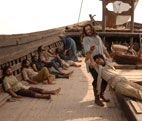 Mohammad Bozorgnia, who has worked as Dariush Mehrjui’s assistant for many years, has been always interested in making films about sea. The Ship Angelica, Battle of Oil Tankers, Storm, and The Maritime Silk Road are all about personalities who are one way or another connected to the sea. A Place to Love was his sole film which had nothing to do with the sea. It was made four years ago and was a failure. Some of his films are about contemporary society of Iran (Battle of Oil Tankers, Storm) and some go back in time (The Ship Angelica, The Maritime Silk Road). Mohammad Bozorgnia, who has worked as Dariush Mehrjui’s assistant for many years, has been always interested in making films about sea. The Ship Angelica, Battle of Oil Tankers, Storm, and The Maritime Silk Road are all about personalities who are one way or another connected to the sea. A Place to Love was his sole film which had nothing to do with the sea. It was made four years ago and was a failure. Some of his films are about contemporary society of Iran (Battle of Oil Tankers, Storm) and some go back in time (The Ship Angelica, The Maritime Silk Road).
-
Members of Academy of Motion Picture Arts & Sciences in Iran
Following frequent visits to Tehran by renowned American and international filmmakers in past years, now the Iranian capital city is playing host to members of Board of Governors of Academy of Motion Picture Arts & Sciences (Oscar) who are here on the official invitation of the House of Cinema. During their stay, they will take part in a number of specialized seminars. The visitors include Sid Ganis (President of the Academy since 2005), Annette Bening (actress), William Horberg (producer), Frank Pierson (screenwriter), Phil Robinson (writer and director), James Longley (documentarian), Alfre Woodard (actress), Ellen Harrington (the Academy’s director of exhibitions and special events) and Tom Pollock (producer and chairman of Universal Pictures). During their stay in Iran, the delegates are to meet with Iranian filmmakers and deliver speeches on development of guild activities on Sunday, March 1, and Tuesday, March 3. Screenwriting, directing, acting, making documentaries, production, marketing and distribution are other topics to be discussed in those seminars. The visitors will also hold common sessions with boards of directors and officials of different cinema guilds and are expected to tour Film Museum of Iran and visit a cinema school. Sid Ganis and accompanying delegation set out for Iran just three days after Oscar ceremony and their presence in the country has been considered as one of the most important cultural developments in recent years. They will attend a number of specialized seminars as scheduled. Annette Bening and Alfre Woodard will take part in a seminar about acting on Sunday, March 1 followed by a seminar on writing and film directing to be attended by Frank Pierson and Phil Robinson; and a seminar on making documentaries to be attended by James Longley. On Tuesday, March 3, Sid Ganis, William Horberg, and Tom Pollock will take part in a seminar on film production, distribution, and marketing. Besides official gatherings, the American Oscar officials will also travel to Isfahan and Shiraz to tour historical sites of both cities.
-
The Third Wave
 Arash Sajjadi Hosseini, director of The Third Wave has announced that it is a surrealistic film which does not allow viewers to easily differentiate between real and unreal scenes. Making such films has been always a problem in the Iranian cinema with the most important problem being lack of suitable screenplays as well as technical facilities to construct imaginary and dream scenes in a believable manner. Travelers, the prominent work of Bahram Baizai, is one of the best films with signs of top surrealistic films of world cinema in it. The Third Wave is based on two parallel stories belonging to two periods of the Iranian history. Arash Sajjadi Hosseini, director of The Third Wave has announced that it is a surrealistic film which does not allow viewers to easily differentiate between real and unreal scenes. Making such films has been always a problem in the Iranian cinema with the most important problem being lack of suitable screenplays as well as technical facilities to construct imaginary and dream scenes in a believable manner. Travelers, the prominent work of Bahram Baizai, is one of the best films with signs of top surrealistic films of world cinema in it. The Third Wave is based on two parallel stories belonging to two periods of the Iranian history.
-
Burden of Being
 Amir Qavidel is an experienced director of the Iranian cinema who has also worked for as assistant to Samuel Khachikian for many years. His films have inspired famous directors who followed him like Massoud Kimiaei. Qavidel made many films after the revolution. He was also assistant to Khachikian in his last works. There are melodramas and horror movies on his track record which are of medium quality. Burden of Being is his latest film in horror genre and is about a girl who tries unconventional means to overcome her problems. His last film was made eight years ago. In the meantime, he was supposed to direct another film, but a serious accident caused him to be replaced by another director. Qavidel has noted that he made Burden of Being to pay tribute to his mentor, Khachikian who has made early horror movies of the Iranian cinema. Amir Qavidel is an experienced director of the Iranian cinema who has also worked for as assistant to Samuel Khachikian for many years. His films have inspired famous directors who followed him like Massoud Kimiaei. Qavidel made many films after the revolution. He was also assistant to Khachikian in his last works. There are melodramas and horror movies on his track record which are of medium quality. Burden of Being is his latest film in horror genre and is about a girl who tries unconventional means to overcome her problems. His last film was made eight years ago. In the meantime, he was supposed to direct another film, but a serious accident caused him to be replaced by another director. Qavidel has noted that he made Burden of Being to pay tribute to his mentor, Khachikian who has made early horror movies of the Iranian cinema.
-
Shoot the Target
 Many people have already switched to film directing which include screenwriters, assistant directors, photographers, and critics. However, there are few sound recordists who have turned directors. Mohammad Katiraei, director of Shoot the Target was sound recordist in Vahid Mousaeian’s and Saman Salour’s films and this is his first experience as director. Shoot the Target is about young Iranian generation who becomes delinquent due to identity problem. The producer, Jahangir Kowsari, has already produced films for novice directors to show his interest in working with young people. He has produced early works of such directors as Mona Zandi, Shalizeh Arefpour, and Mohammad Ebrahim Moayyeri and has also helped Katiraei with his first film. Many people have already switched to film directing which include screenwriters, assistant directors, photographers, and critics. However, there are few sound recordists who have turned directors. Mohammad Katiraei, director of Shoot the Target was sound recordist in Vahid Mousaeian’s and Saman Salour’s films and this is his first experience as director. Shoot the Target is about young Iranian generation who becomes delinquent due to identity problem. The producer, Jahangir Kowsari, has already produced films for novice directors to show his interest in working with young people. He has produced early works of such directors as Mona Zandi, Shalizeh Arefpour, and Mohammad Ebrahim Moayyeri and has also helped Katiraei with his first film.
-
3rd Police Film Festival
Out of different annual festivals in Iran, Police Film Festival has been both sensational and attracted large audience in recent years due to correct strategy of its organizers. The festival aims to appreciate worthwhile police films aimed at reducing social maladies. This year, 49 features, 154 documentaries and 74 telefilms were present in the festival. Alireza Sajjadpour, who manages this festival, is a screenwriter and producer of the Iranian cinema and television and is close to president in cultural affairs. Before taking charge of this festival, he was manager of one of the best cultural complexes in Tehran. Davoud Rashidi and Ezzatollah Entezami, two seasoned Iranian actors, addressed the festival and talked about its important impact.
-
2nd Academy of Asia-Pacific Screen Award
The second edition of Academy of Asia-Pacific Screen Award introduced its winners in nine sections on November 11, 2008, with representatives of the Iranian cinema winning two awards. Behnam Behzadi’s We Only Live Twice was nominated for the best screenplay; Alireza Aghakhani; actor of Behzadi’s film, and Reza Naji, actor of Song of the Sparrows, were nominated for the best performance by an actor; and Mehdi Moniri’s Tinar was nominated for the best documentary feature film. Finally, Reza Naji won an award for the best performance by an actor and Mehdi Moniri’s beautiful documentary, Tinar, won UNESCO Award.
-
Documentaries about prominent Iranian films
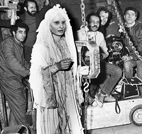 As DVDs become popular in Iran and state-run television is willing to focus on prominent feature films made after the revolution, Nahid Delagah, the experienced producer of documentary films, has taken charge of producing 30 documentaries about 30 important Iranian films. She invited young documentarians to take part in this project. Their films included footages of behind the scenes, interviews with production crew, viewpoints of critics, and historical role of those films. Before Delagah, Reza Mirkarimi was in charge of this project. Major films considered in this project have been produced in the past 30 years and will be aired on the state television to mark the 30th anniversary of the Islamic Revolution. As DVDs become popular in Iran and state-run television is willing to focus on prominent feature films made after the revolution, Nahid Delagah, the experienced producer of documentary films, has taken charge of producing 30 documentaries about 30 important Iranian films. She invited young documentarians to take part in this project. Their films included footages of behind the scenes, interviews with production crew, viewpoints of critics, and historical role of those films. Before Delagah, Reza Mirkarimi was in charge of this project. Major films considered in this project have been produced in the past 30 years and will be aired on the state television to mark the 30th anniversary of the Islamic Revolution.
-
Autumnal Saplings
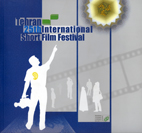 During the past decade, two state bodies have consistently supported production of short, documentary and experimental films. Documentary and experimental works are generally supported by Documentary and Experimental Film Center (DEFC) while Iranian Young Cinema Society (IYCS) usually supports short films. The first group of films is screened in Cinema Verite Festival while short films are screened and judged in a separate festival which is sponsored by the Iranian Young Cinema Society. The society has introduced many talents to the Iranian cinema, the most prominent of whom was Bahman Qobadi. It has many branches in different cities of Iran where professional principles of cinema are taught and productions which are, in fact, graduates’ theses are supported. Some of those works which are of higher quality are sent to central office of the Society in Tehran for screening in Tehran International Short Film Festival. During the past decade, two state bodies have consistently supported production of short, documentary and experimental films. Documentary and experimental works are generally supported by Documentary and Experimental Film Center (DEFC) while Iranian Young Cinema Society (IYCS) usually supports short films. The first group of films is screened in Cinema Verite Festival while short films are screened and judged in a separate festival which is sponsored by the Iranian Young Cinema Society. The society has introduced many talents to the Iranian cinema, the most prominent of whom was Bahman Qobadi. It has many branches in different cities of Iran where professional principles of cinema are taught and productions which are, in fact, graduates’ theses are supported. Some of those works which are of higher quality are sent to central office of the Society in Tehran for screening in Tehran International Short Film Festival.
-
Film Directors Meet with Mahmoud Ahmadinejad
During past few years, different political and religious figures of the Islamic Republic of Iran have met with film directors to talk about their viewpoints and demands. Two years ago, Supreme Leader Ayatollah Khamenei met with directors and lauded their efforts for culture building and promised to support the Iranian cinema. The meeting was run by Majid Majidi and was attended by renowned directors such as Ebrahim Hatami-Kia, Dariush Farhang, Tahmineh Milani, Ahmad Amini, Fereidoun Jeirani, Iraj Karimi, Jamal Sourjeh, Alireza Raeisian, Abolqasem Talebi and others.
-
Tale of a City
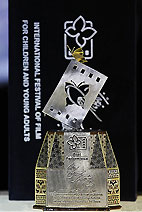 After being held in Isfahan for many years, this year, the second edition of Festival of Films for Children and Young Adults was held in Hamedan. Festival officials did their best to be hospitable to domestic and foreign guests. Opening and closing ceremonies were held according to necessary standards. The festival was received so warmly by local authorities in Hamedan that a “permanent secretariat” was launched there to make sure that the festival will not move to another city in the foreseeable future. A great idea by festival authorities in the current year was to take some programs to nearby cities like Razan, Asadabad, Malayer, Nahavand, Lalehjin, Toiserkan, and Kaboudarahang. Citizens of Hamedan also received the festival enthusiastically and theaters were full when screening both Iranian and foreign films. Owners of theaters, therefore, had to arrange extra showtimes every day. After being held in Isfahan for many years, this year, the second edition of Festival of Films for Children and Young Adults was held in Hamedan. Festival officials did their best to be hospitable to domestic and foreign guests. Opening and closing ceremonies were held according to necessary standards. The festival was received so warmly by local authorities in Hamedan that a “permanent secretariat” was launched there to make sure that the festival will not move to another city in the foreseeable future. A great idea by festival authorities in the current year was to take some programs to nearby cities like Razan, Asadabad, Malayer, Nahavand, Lalehjin, Toiserkan, and Kaboudarahang. Citizens of Hamedan also received the festival enthusiastically and theaters were full when screening both Iranian and foreign films. Owners of theaters, therefore, had to arrange extra showtimes every day.
-
12th Iranian Cinema Celebration
 Iranian cinema celebration is the most important event of the Iranian cinema after Fajr International Film Festival. Although the celebration is much younger than Fajr Festival, its authorities insist that the event should stay away from politics. Perhaps, for that reason, awards given out during the celebration have been much different from those given in Fajr Film Festival. For example, a film which has been awarded in Fajr Festival because it has been in line with government’s policies is usually snubbed in cinema celebration while another film which has been made according to standards of commercial cinema and has been turned down due to the intellectual air governing Fajr Festival, may be appreciated in cinema celebration. Iranian cinema celebration is the most important event of the Iranian cinema after Fajr International Film Festival. Although the celebration is much younger than Fajr Festival, its authorities insist that the event should stay away from politics. Perhaps, for that reason, awards given out during the celebration have been much different from those given in Fajr Film Festival. For example, a film which has been awarded in Fajr Festival because it has been in line with government’s policies is usually snubbed in cinema celebration while another film which has been made according to standards of commercial cinema and has been turned down due to the intellectual air governing Fajr Festival, may be appreciated in cinema celebration.
-
Heaven, Hell, Purgatory
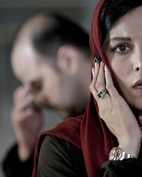 Bijan Mirbaqeri is one of those directors who has appeared promising to most critics because of two films he has produced thus far. His first film, We Are All Fine (2004), introduced a new narrative method to the Iranian cinema. The film was about a young man who had left his family for years and was living outside the country. Now he asked his family members to make a film of themselves and send it to him through one of his friends. Spectators never see the young man and never know whether the letter has been actually written by him or someone else (because his family has no access to him). Bijan Mirbaqeri is one of those directors who has appeared promising to most critics because of two films he has produced thus far. His first film, We Are All Fine (2004), introduced a new narrative method to the Iranian cinema. The film was about a young man who had left his family for years and was living outside the country. Now he asked his family members to make a film of themselves and send it to him through one of his friends. Spectators never see the young man and never know whether the letter has been actually written by him or someone else (because his family has no access to him).
-
About Elli
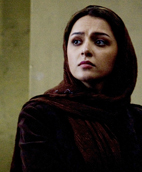 Asghar Farhadi is among talented filmmakers who have started and continued their professional carrier during the past decade. His films appeal to both ordinary audience and critics. After Dance in the Dust (2000) and Shahr-e Ziba (2002), he worked with Mani Haqiqi in his third film, Fireworks Wednesday and they have worked together since that time. Haqiqi helped Farhadi with screenplay of Fireworks Wednesday and Farhadi helped with screenplay of Canaan (Mani Haqiqi). Asghar Farhadi is among talented filmmakers who have started and continued their professional carrier during the past decade. His films appeal to both ordinary audience and critics. After Dance in the Dust (2000) and Shahr-e Ziba (2002), he worked with Mani Haqiqi in his third film, Fireworks Wednesday and they have worked together since that time. Haqiqi helped Farhadi with screenplay of Fireworks Wednesday and Farhadi helped with screenplay of Canaan (Mani Haqiqi).
-
Pennilessness
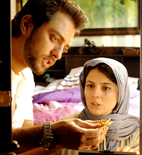 Pennilessness is the second feature film by Hamid Ne’matollah after his successful production, Boutique (2003). Before making Boutique, Ne’matollah worked as a journalist for a while and then became an assistant to seasoned Iranian director, Massoud Kimiaei. Boutique was an inexpensive film about true situation of the Iranian youth. Main roles were played by Mohammad Reza Golzar and Golshifteh Farahani. Pennilessness is the second feature film by Hamid Ne’matollah after his successful production, Boutique (2003). Before making Boutique, Ne’matollah worked as a journalist for a while and then became an assistant to seasoned Iranian director, Massoud Kimiaei. Boutique was an inexpensive film about true situation of the Iranian youth. Main roles were played by Mohammad Reza Golzar and Golshifteh Farahani.
-
The Postman Doesn't Knock Three Times
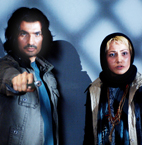 Hassan Fathi is a director whose television series have been generally successful, though his single feature film, Marriage, Iranian Style (2004) was not remarkable though it was an office box hit. On the opposite, television series directed by him have been among the most successful series of past years including Brighter than Darkness (about the life and works of Molla Sadra, the great Iranian mystic and philosopher), The Tenth Night (about passion play and mourning ceremony among Iranians), The Zero Degree Circle (about contemporary history of Iran), and... Hassan Fathi is a director whose television series have been generally successful, though his single feature film, Marriage, Iranian Style (2004) was not remarkable though it was an office box hit. On the opposite, television series directed by him have been among the most successful series of past years including Brighter than Darkness (about the life and works of Molla Sadra, the great Iranian mystic and philosopher), The Tenth Night (about passion play and mourning ceremony among Iranians), The Zero Degree Circle (about contemporary history of Iran), and...
-
Academy of Asia – Pacific Screen Award
 Asia – Pacific Screen Award, which was very successful in its first edition, is planning to achieve more important goals it is pursuing for promotion of Asian and Pacific cinemas. Des Power announced establishment of the Award in May 8 which is supported by the Australian actor, Jack Thompson. More details were revealed on May 16 during Cannes Film Festival. The event, whose first edition was held last year sponsored by UNESCO, FIAPF (International Federation of Film Producers Associations), and CNN International, aims to promote Asia and Pacific cinemas and filmmakers and to introduce them in international markets in order to find new markets for them. Des Power, chairman of Asia – Pacific Screen Award, announced that establishing Academy of Asia – Pacific Screen Award would be a next step to be taken to encourage cooperation and dialogue among regional filmmakers in order to create more trade opportunities for them. All 65 nominees for Asia – Pacific Screen Award in 2007 will become members of the Academy and a similar number of nominees are expected to become members of the Academy during the current year. Asia – Pacific Screen Award, which was very successful in its first edition, is planning to achieve more important goals it is pursuing for promotion of Asian and Pacific cinemas. Des Power announced establishment of the Award in May 8 which is supported by the Australian actor, Jack Thompson. More details were revealed on May 16 during Cannes Film Festival. The event, whose first edition was held last year sponsored by UNESCO, FIAPF (International Federation of Film Producers Associations), and CNN International, aims to promote Asia and Pacific cinemas and filmmakers and to introduce them in international markets in order to find new markets for them. Des Power, chairman of Asia – Pacific Screen Award, announced that establishing Academy of Asia – Pacific Screen Award would be a next step to be taken to encourage cooperation and dialogue among regional filmmakers in order to create more trade opportunities for them. All 65 nominees for Asia – Pacific Screen Award in 2007 will become members of the Academy and a similar number of nominees are expected to become members of the Academy during the current year.
-
Construction and Reconstruction of Theaters
 Theaters have been a chronic problem of the Iranian cinema for many years. Before the revolution, there were more theaters in the country. After the revolution, doubts about continuation of cinema activities led to relative standstill of the industry. However, 30 years have passed from the time that Imam Khomeini gave the go-ahead for Iranian filmmakers to continue their work and the number of theaters has increased. The reason behind low number of existing theaters compared to pre-revolution years is that many of them have been shut down on different grounds. Even some theaters which were run by capitalists affiliated with the former Shah, have been confiscated and turned into malls. Others have gone bankrupt due to inability to pay tax and other reasons and have been mothballed during the past years. Theaters have been a chronic problem of the Iranian cinema for many years. Before the revolution, there were more theaters in the country. After the revolution, doubts about continuation of cinema activities led to relative standstill of the industry. However, 30 years have passed from the time that Imam Khomeini gave the go-ahead for Iranian filmmakers to continue their work and the number of theaters has increased. The reason behind low number of existing theaters compared to pre-revolution years is that many of them have been shut down on different grounds. Even some theaters which were run by capitalists affiliated with the former Shah, have been confiscated and turned into malls. Others have gone bankrupt due to inability to pay tax and other reasons and have been mothballed during the past years.
-
1st National Animation Conference
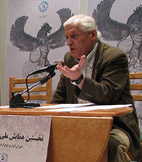 Last year and on the occasion of the 50th anniversary of animation film production in Iran, Iranian animators noted that many countries have no track record in the field of animation while all needed infrastructures and facilities for producing animation films were provided in Iran. They added that Iran could even have its own animation style because all it takes to make a good animation is creative mind and artistic management, which exist in Iran. Akbar A’lami, secretary of the first national animation conference of Iran said that the measure was aimed to organize past ideas and announced that assessment of the status quo as well as art planning and management by private, semi-private, and state-run sectors will promote standing of Iranian animations in the world. Last year and on the occasion of the 50th anniversary of animation film production in Iran, Iranian animators noted that many countries have no track record in the field of animation while all needed infrastructures and facilities for producing animation films were provided in Iran. They added that Iran could even have its own animation style because all it takes to make a good animation is creative mind and artistic management, which exist in Iran. Akbar A’lami, secretary of the first national animation conference of Iran said that the measure was aimed to organize past ideas and announced that assessment of the status quo as well as art planning and management by private, semi-private, and state-run sectors will promote standing of Iranian animations in the world.
-
Situation of Film Screening in Iran
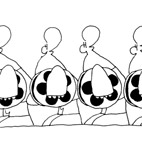 The cinema year in Iran starts after the end of Fajr International Film Festival (usually February 12). The new Iranian year starts about one month later (March 20) and in the meantime, applicant films are screened. This trend continues until the next Fajr Festival. About one decade ago, public screening of Iranian films was made conditional on their screening at Fajr International Film Festival. However, since many commercial films are now not accepted to the festival and it has become more specialistic, many such films are publicly screened without being screened at the Festival. Also, producers can decide whether to send their films to the Festival or not. That is, all films that do not take part at Fajr International Film Festival are not necessarily commercial ones. The cinema year in Iran starts after the end of Fajr International Film Festival (usually February 12). The new Iranian year starts about one month later (March 20) and in the meantime, applicant films are screened. This trend continues until the next Fajr Festival. About one decade ago, public screening of Iranian films was made conditional on their screening at Fajr International Film Festival. However, since many commercial films are now not accepted to the festival and it has become more specialistic, many such films are publicly screened without being screened at the Festival. Also, producers can decide whether to send their films to the Festival or not. That is, all films that do not take part at Fajr International Film Festival are not necessarily commercial ones.
-
Society of Directors
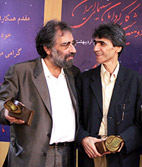 “House of Cinema” is the most important cinema organization in Iran which covers 29 professions such as producers, directors of photography, actors, editors … and even film critics. Society of Directors is the oldest and the most active of cinema organizations in Iran. Its foremost mission is to protect the interests of its membership which consists of almost all Iranian directors. The articles of association of House of Cinema have noted that it aims to “protect and safeguard the basic rights of directors through ensuring their job security.” The society has taken effective steps during past years and has been consequential in developments of the Iranian cinema during those years. For example, when differences between Bahram Baizai and producer of Killing Rabids (Behrouz Hashemiyan) heightened, the society intervened and defended the rights of the seasoned Iranian director. As a result, his film was screened under the best conditions. Last year, after a lot of debates over the ban on Dariush Mehrjui’s The Dulcimer Player, Society of Directors did its best to help the film, though its efforts have not been fruitful thus far. “House of Cinema” is the most important cinema organization in Iran which covers 29 professions such as producers, directors of photography, actors, editors … and even film critics. Society of Directors is the oldest and the most active of cinema organizations in Iran. Its foremost mission is to protect the interests of its membership which consists of almost all Iranian directors. The articles of association of House of Cinema have noted that it aims to “protect and safeguard the basic rights of directors through ensuring their job security.” The society has taken effective steps during past years and has been consequential in developments of the Iranian cinema during those years. For example, when differences between Bahram Baizai and producer of Killing Rabids (Behrouz Hashemiyan) heightened, the society intervened and defended the rights of the seasoned Iranian director. As a result, his film was screened under the best conditions. Last year, after a lot of debates over the ban on Dariush Mehrjui’s The Dulcimer Player, Society of Directors did its best to help the film, though its efforts have not been fruitful thus far.
-
Intense Competition in 61st Cannes Film Festival
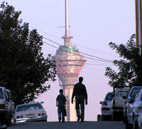 A Song for Loneliness of Tehran (Saman Salur) was screened in “directors’ fortnight” section of Cannes Film Festival. The film was taken to Cannes and distributed internationally by Dreamlab Company which is managed by Nasrin Mireshab and was the sole Iranian film at the 61st Cannes Festival. Although, Iranian filmmakers were not happy that their country was only represented by a single film at one of the world’s most important cinema affairs, their reactions were more logical than the preceding year. Cannes Film Festival is considered very important by film producers and distributors due to its significance as a cinema event and the opportunity it provides them to market their films. A Song for Loneliness of Tehran (Saman Salur) was screened in “directors’ fortnight” section of Cannes Film Festival. The film was taken to Cannes and distributed internationally by Dreamlab Company which is managed by Nasrin Mireshab and was the sole Iranian film at the 61st Cannes Festival. Although, Iranian filmmakers were not happy that their country was only represented by a single film at one of the world’s most important cinema affairs, their reactions were more logical than the preceding year. Cannes Film Festival is considered very important by film producers and distributors due to its significance as a cinema event and the opportunity it provides them to market their films.
-
Kiarostami and Opera
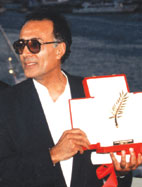 At first, it looked incredible, but it was true. Kiarostami is now engaged in opera, or in better words, opera has engaged him! Before him, a number of famous filmmakers had been active in that field, but opera was part of their cultural characteristics. Kiarostami is planning to premiere Mozart’s Cosi Fan Tutta opera in Aix-en-Provence musical festival of France from June 4 to June 19, 2008. Kiarostami has told AFP that he would be very active in his new experience. He has noted that when the idea was first proposed to him, he rejected it, but he has changed his mind since then. “Now that I have changed my mind, I think that performing an opera should not be more difficult than making a film. There are many limitations in opera, but not so serious as to prevent my work.”
Christophe Rousset, the French conductor of Baroque Orchestra, will direct the musical opera which will be produced in cooperation with English National Opera. The opera will premiere in France before its performance in England. At first, it looked incredible, but it was true. Kiarostami is now engaged in opera, or in better words, opera has engaged him! Before him, a number of famous filmmakers had been active in that field, but opera was part of their cultural characteristics. Kiarostami is planning to premiere Mozart’s Cosi Fan Tutta opera in Aix-en-Provence musical festival of France from June 4 to June 19, 2008. Kiarostami has told AFP that he would be very active in his new experience. He has noted that when the idea was first proposed to him, he rejected it, but he has changed his mind since then. “Now that I have changed my mind, I think that performing an opera should not be more difficult than making a film. There are many limitations in opera, but not so serious as to prevent my work.”
Christophe Rousset, the French conductor of Baroque Orchestra, will direct the musical opera which will be produced in cooperation with English National Opera. The opera will premiere in France before its performance in England.
-
Filmmakers’ Letter of Protest: Answers and Reactions
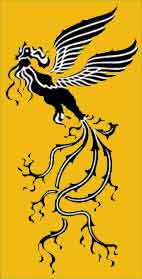 Not screening some of the Iranian films in Fajr International Film Festival has been source of much controversy during the past few years. Of course, it cannot be solely blamed on censorship, but half of about 100 films which apply to take part at the festival, are not accepted due to limited capacity of this event. Some of them are not screened at the festival because technical phases take so long. However, before the beginning of this year’s edition of Fajr International Film Festival, the selection board decided to exclude some famous films; a decision which led to unprecedented controversies. Perhaps screening The Dulcimer Player in last year’s festival and its consequences, prompted some cinema authorities to make a final decision on some films during the festival. Censorship of some films and banning others elicited various reactions from filmmakers who wrote a polite letter to cinema authorities expecting a clear answer from them and cultural policymakers. Not screening some of the Iranian films in Fajr International Film Festival has been source of much controversy during the past few years. Of course, it cannot be solely blamed on censorship, but half of about 100 films which apply to take part at the festival, are not accepted due to limited capacity of this event. Some of them are not screened at the festival because technical phases take so long. However, before the beginning of this year’s edition of Fajr International Film Festival, the selection board decided to exclude some famous films; a decision which led to unprecedented controversies. Perhaps screening The Dulcimer Player in last year’s festival and its consequences, prompted some cinema authorities to make a final decision on some films during the festival. Censorship of some films and banning others elicited various reactions from filmmakers who wrote a polite letter to cinema authorities expecting a clear answer from them and cultural policymakers.
-
Distribution of Illegal DVDs of The Dulcimer Player
 One year after screening of The Dulcimer Player in last year’s Fajr International Film Festival and following a whole year of controversies and conflicting news about public screening of the film or its prohibition, the worst fears of producers came true and illegal DVDs of the film were sold on streets. This was a repetition of what had already happened to The Lizard, Offside, and The Expelled. The difference, however, was that The Lizard was partially, but successfully, screened at theaters, The Expelled had broken sales record of the Iranian cinema, and Offside had both taken part in international festivals and sold overseas. One year after screening of The Dulcimer Player in last year’s Fajr International Film Festival and following a whole year of controversies and conflicting news about public screening of the film or its prohibition, the worst fears of producers came true and illegal DVDs of the film were sold on streets. This was a repetition of what had already happened to The Lizard, Offside, and The Expelled. The difference, however, was that The Lizard was partially, but successfully, screened at theaters, The Expelled had broken sales record of the Iranian cinema, and Offside had both taken part in international festivals and sold overseas.
-
Iranian Style “Copyright”
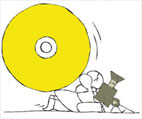 The Iranian president issued an order endorsing the law for punishment of those who are illegally engaged in audio and visual activities. According to that law, all forms of commercial activities in production, distribution, and presentation of audio and visual works, tapes and CDs would be only possible after obtaining relevant permits from Ministry of Culture and Islamic Guidance and violators would be sentenced to pecuniary punishment ranging from 1,000 euros to 10,000 euros. The law has also obliged the police to prevent such activities, close down all places engaged in these activities and arrest offenders. The Iranian president issued an order endorsing the law for punishment of those who are illegally engaged in audio and visual activities. According to that law, all forms of commercial activities in production, distribution, and presentation of audio and visual works, tapes and CDs would be only possible after obtaining relevant permits from Ministry of Culture and Islamic Guidance and violators would be sentenced to pecuniary punishment ranging from 1,000 euros to 10,000 euros. The law has also obliged the police to prevent such activities, close down all places engaged in these activities and arrest offenders.
-
26th International Fajr Film Festival
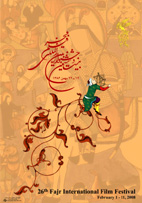 The 26th Fajr International Film Festival contains several different sections with Iranian and non-Iranian films. In the section dedicated to Iranian Cinema Competition, many new Iranian films, including the latest works by Bahman Farmanara, Majid Majidi, Kamal Tabrizi, Reza Mirkarimi, Ebrahim Forouzesh, Mohammad-Reza Aslani and many others will be screened and judged by the jury.
The festival contains some other competitive sections as well: International Competition, including some well-known names and titles such as Tony Gilroy Michael Clayton, Nikita Mikhalkov 12, Aleksandr Sokurov Alexandr, Brian De Palma's Redacted, etc.; The 26th Fajr International Film Festival contains several different sections with Iranian and non-Iranian films. In the section dedicated to Iranian Cinema Competition, many new Iranian films, including the latest works by Bahman Farmanara, Majid Majidi, Kamal Tabrizi, Reza Mirkarimi, Ebrahim Forouzesh, Mohammad-Reza Aslani and many others will be screened and judged by the jury.
The festival contains some other competitive sections as well: International Competition, including some well-known names and titles such as Tony Gilroy Michael Clayton, Nikita Mikhalkov 12, Aleksandr Sokurov Alexandr, Brian De Palma's Redacted, etc.;
-
Death of a Lover
 Dying three days after his 60th birthday, he was among the most influential figures of the Iranian cinema. Nour started his career in cinema when he was 20. If educated young movies buffs are more interested in directing or appearing in movies, Nour was more willing to be a producer from the beginning. At an age of 20, he was a co-producer of a film. Since he was not a professional and looked at cinema from an idealistic and romantic viewpoint, Foad came to realize through his first experience that how ruthless cinema could be. Dying three days after his 60th birthday, he was among the most influential figures of the Iranian cinema. Nour started his career in cinema when he was 20. If educated young movies buffs are more interested in directing or appearing in movies, Nour was more willing to be a producer from the beginning. At an age of 20, he was a co-producer of a film. Since he was not a professional and looked at cinema from an idealistic and romantic viewpoint, Foad came to realize through his first experience that how ruthless cinema could be.
-
"M for Mother", Iranian Representative for the 80th Academy Awards
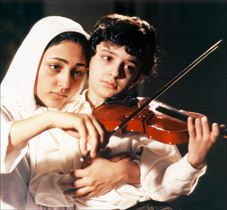 In Iran, like all other countries, selecting the country's entry for the Academy Awards ceremony has been always controversial. Every year a group of filmmakers and officials from the Culture Ministry and even the TV organization get together to select the entry from among the candidates. This year, the decision was to be made by Amir Esfandiari (Farabi Cinema Foundation's International Relations Director), Mohammad Bozorgnia, Kamal Tabrizi, Mojtaba Raee and Rassoul Sadr-Ameli (film directors), Mohammad Reza Sokout (cinematographer), Taqi Aliqolizadeh (representing the TV), Alireza Shoja-Nouri (producer) and Akbar Nabavi (film expert). At the end, they chose M for Mother, a film few would have thought of as the likely nominee. In Iran, like all other countries, selecting the country's entry for the Academy Awards ceremony has been always controversial. Every year a group of filmmakers and officials from the Culture Ministry and even the TV organization get together to select the entry from among the candidates. This year, the decision was to be made by Amir Esfandiari (Farabi Cinema Foundation's International Relations Director), Mohammad Bozorgnia, Kamal Tabrizi, Mojtaba Raee and Rassoul Sadr-Ameli (film directors), Mohammad Reza Sokout (cinematographer), Taqi Aliqolizadeh (representing the TV), Alireza Shoja-Nouri (producer) and Akbar Nabavi (film expert). At the end, they chose M for Mother, a film few would have thought of as the likely nominee.
-
Punishment for Film Smugglers
Following illegal release of CD and DVD versions of bestselling Iranian films during recent years in the open market, authorities have finally ratified a new law for punishment of film smugglers.
-
Deceased: Aziz Rafiei (1923-2007)
 The old cinematographer of Iran passed a cinematography course at al-Ahram Studio in Egypt in 1950s. Back in Iran, he founded Karevan Film Studio along with his two brothers and started editing and shooting films. The old cinematographer of Iran passed a cinematography course at al-Ahram Studio in Egypt in 1950s. Back in Iran, he founded Karevan Film Studio along with his two brothers and started editing and shooting films.
-
Directors’ Night
 Directors of the Iranian cinema came together on May 6 to have a heart-to-heart talk for the first time. The session was organized by the Iranian Cinema Directors Association. Directors of the Iranian cinema came together on May 6 to have a heart-to-heart talk for the first time. The session was organized by the Iranian Cinema Directors Association.

- Seeing is believing
29th Il Cinema Ritrovato Film Festival, Bologna (27 June - 4 July 2015)
- Breakfast in Tolochenaz
11th Zurich International Film Festival(Sept.24-Oct.4, 2015)
- From Zurich with Love
Report on the 10th Zurich International Film Festival (September25-October5, 2014)
- 60 Years Is Nothing
Report on the 60th San Sebastian International Film
Festival
- Like Someone in Love!
The 53rd Thessaloniki International Film Festival (Nov 2-11, 2012)
- News
News in Iranian Cinema
- A Special Ceremony
Iranian cinema: Fajr International Film Festival
- The Great Celebration
Fajr International Film Festival
- Saved Ones of 2000s
Top actors and movie parts in 2000s
- Arranging the Dawn
Ebrahim Haghighi’s Interview with Reza Mirkarimi on "A Cube of Sugar"
- Cinema Helps Us to Tolerate Life!
Interview with Bahram Tavakkoli on the screening of "Here without Me"
- On a Narrow Line
An Interview with Mahtab Keramati:
- Diving into the Depth of the Ocean
Interview with Negar Javaherian for her part in "Here withouth Me"; an adaptation of The "Glass Menagerie":
- Dance in the Dust
52nd Thessaloniki International Film Festival (4-13 Nov. 2011)
- De-light box
The 36th Toronto International Film Festival (September 8-18th, 2011)
- Around the World in Ten Days
35th Montreal World Film Festival (August 18-28, 2011)
- Pond of Imagination
35th Ottawa International Animation Film Festival (September 21-25, 2011)
- Let’s Shovel Some Money!
5th Abu Dhabi Film Festival (October 13-22, 2011)
- Genriran!
Genre in the Iranian Cinema
- News
News in Iranian Cinema
- Banned Films among Top Ten
Economic Report on the Iranian Cinema in 2010:
- A First Step
Films made by young directors:
- Melodrama, Melodrama
Prevailing Genre in the Iranian Cinema: Melodrama
- Short Films Are Not Stepchild of Features
56th International Short Film Festival Oberhausen (April 29 – May 4, 2010)
- 54 Glorious Years!
London Film Festival, October 13-28, 2010
- Ottawa Monogatari
34th Ottawa Animation Film Festival (October 20-24, 2010)
- Action for Earth
23rd Tokyo International Film Festival (Oct. 23-31, 2010)
- Farewell Middle East, Hello Abu Dhabi!
4th Abu Dhabi Film Festival (October 14-23, 2010)
- Women without Men
Women in Iranian Cinema
- News
New Products/ Faces/ Deceased
- The 14th Nights
House of Cinema Celebrations
- Names and Desks
Continued disputes between House of Cinema and State officials:
- Back from Troy
Is Red carpet a European tradition?
|
 Volume 17
Volume 17
Cover: Snow on pines
Director: Peiman No'adi
Producer: Jamal Sadatian
Cast:Mahnaz Afshar, Vishka Asayesh and Saber Abar
Still Photographer: Mohammad Hossein Sadatianmore
|
 Mohsen Makhmalbaf (Director and Screenwriter): Mohsen Makhmalbaf (Director and Screenwriter):
This director and screenwriter, who was once one of the most talked-about figures in the Iranian cinema for children and young adults,
more
|
 A Cube of Sugar (2011): A Cube of Sugar (2011):
A Film by Reza Mirkarimi
The story happens in an old house in an old city of Iran. Because of the wedding of the youngest sister, Pasandide, all of her sisters come to their old house to help their mother.
more
|
|
|

